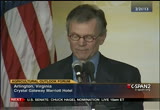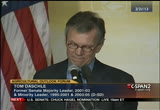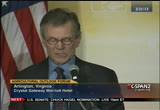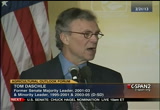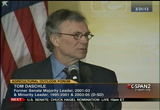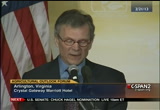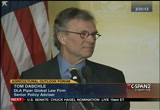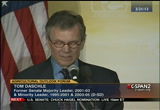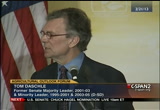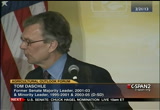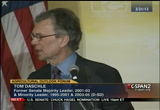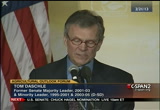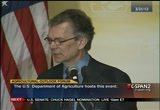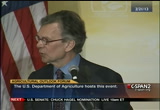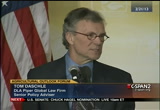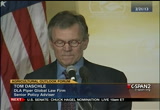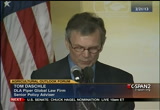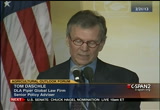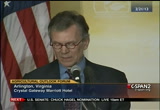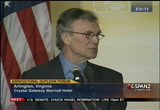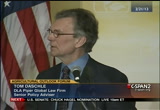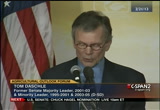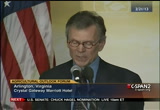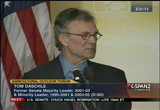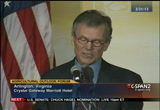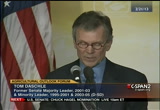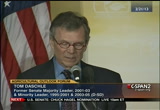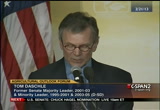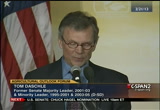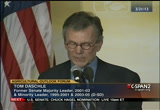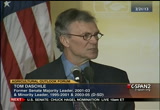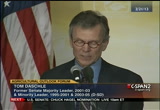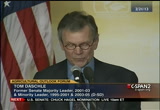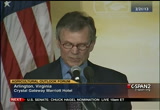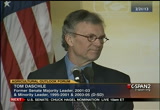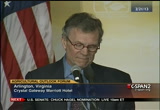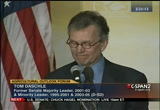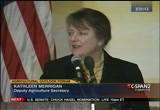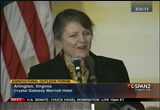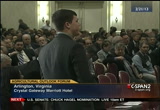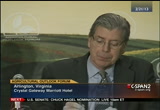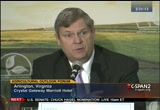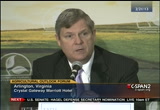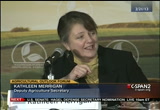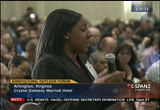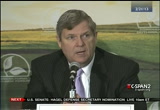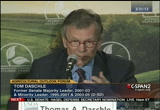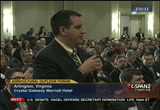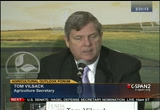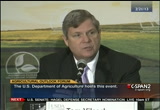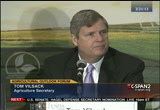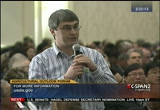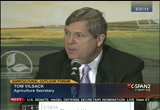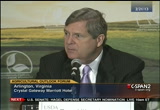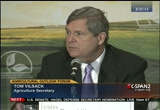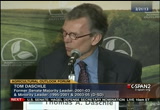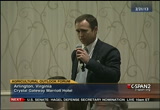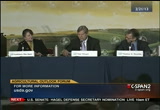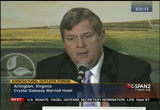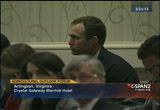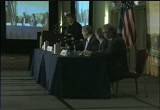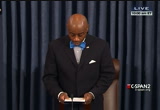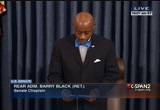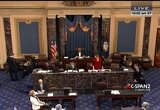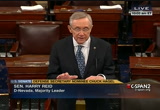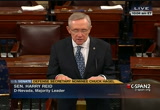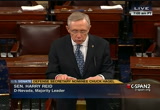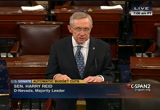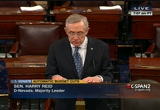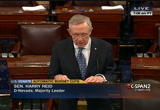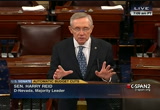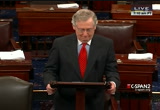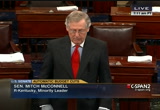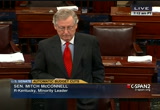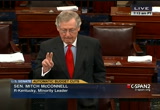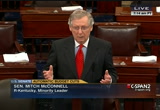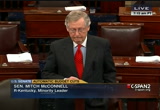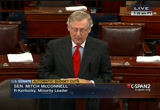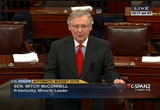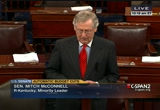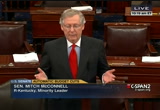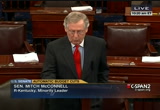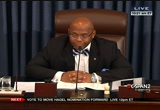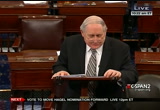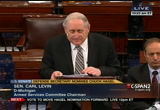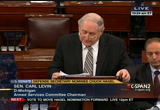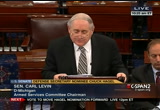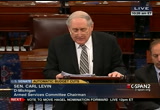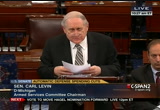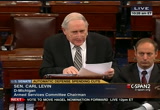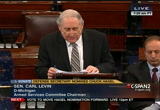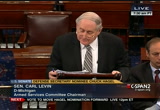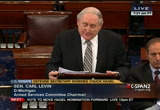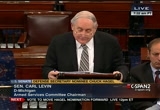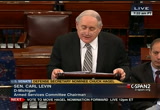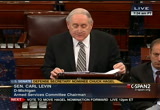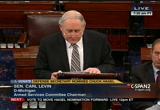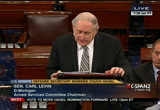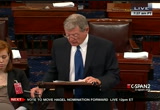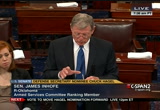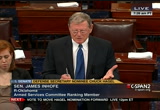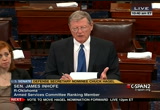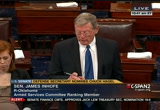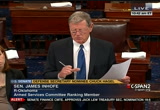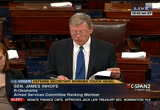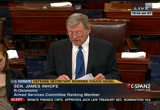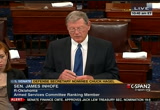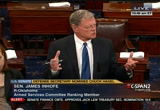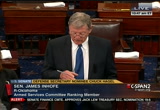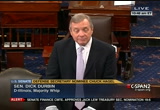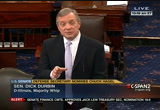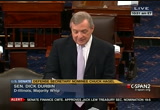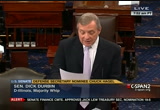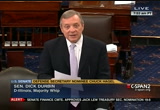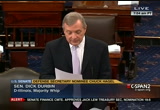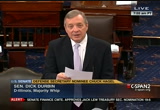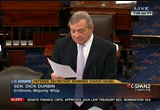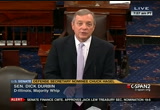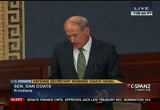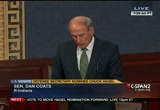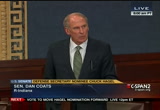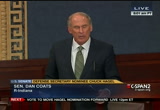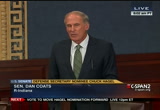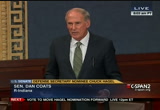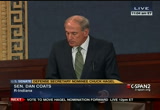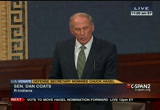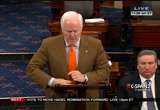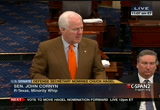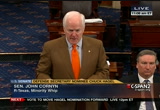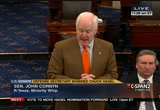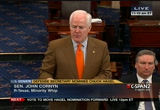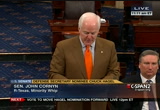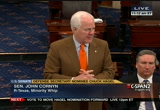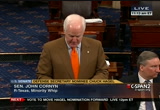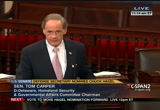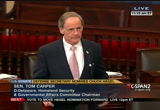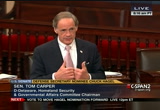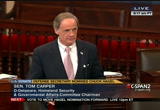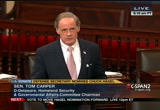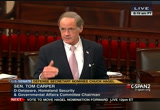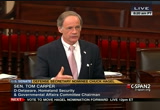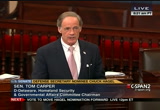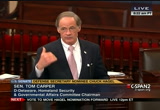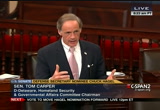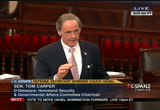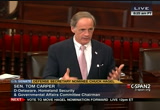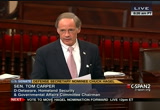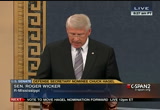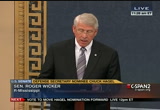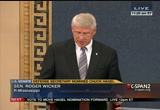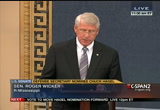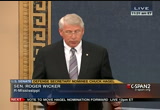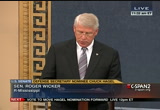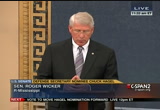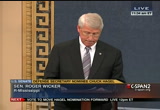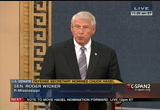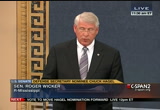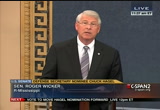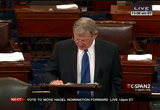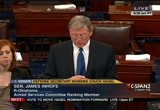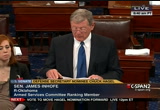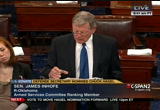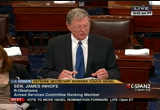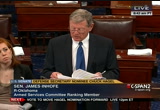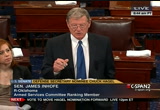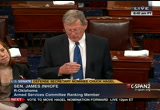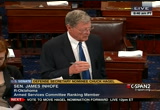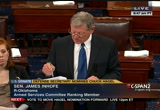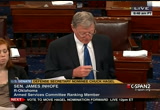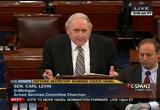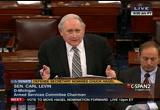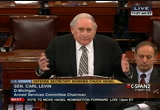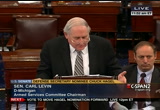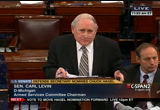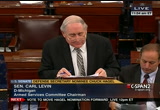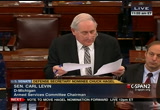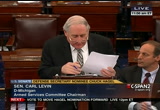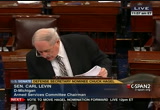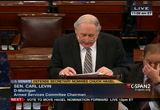tv U.S. Senate CSPAN February 26, 2013 9:00am-12:00pm EST
9:00 am
the u.s. patent office issued patent number 46,454. i will give you a pop quiz. it was simply labeled john deere plow. but the implement sketched out on the page could just as easily been labeled, as some historians have named it, one of the most important inventions in american history. they called it the plow that broke the plains, and it did. by replacing cast-iron with smooth steel, john deere's innovation opened up huge new swaths of land for cultivation. it made it possible for towns like aberdeen south dakota my hometown to exist. before it killing and maker took a grown man a full 24 hours. after it, it took as little as five.
9:01 am
and every pile of soil overturned upended another assumption about what the land could produce. that, to my mind, has been the story, not just of agricultural success, but of national success. and, indeed, of global progress. this kind of game changing innovation has enabled us to leap ahead, to break the points, to increase harvest, and to frankly, feed the whole world. sometimes innovations come from the most advanced science, other times they are simple steps and ideas that come from looking at and listening closely to the problem. but all of them can break down barriers of food security, and allow us to plot entirely new paths of progress. today, more than ever, we need those new pathways forward.
9:02 am
just take a look at just a few recent headlines. drought on mississippi river impacts everything from japanese livestock to american beer. food shortages could force world into vegetarian, warn scientists. patent pending raise new biotech issues. global crop production shows some signs of stagnating. could climate change, the al qaeda's best friend in africa? i could list dozens more. it all adds up to a perfect storm of challenges for global food production, and as a result, challenges for our global economy, and quite literally, the global security. when i think about the factors that make up the perfect storm,
9:03 am
i'm reminded of what mark twain reportedly observed. by land, they are make -- they are not making anymore. in fact, i wish he was right. truth is, global warming is making less. so we need to do more with the land that we still have. every year to 7 billion of us on this of us on the earth already use the equivalent of a planet and a half of resources. yet, 870 million people worldwide still today go to bed hungry. and by the year 2050 there will be over 2 billion more mouths to feed, many of them in the developing world. that's not sustainable. to keep up with this rapidly rising demand, we will need to increase global food production
9:04 am
70% by midcentury. as assistant secretary of state, josé fernandez has said that means producing as much food in the next 50 years as we produced in the last 10,00 10,000. think about that for a minute. between now and the time i grandkids are old enough to attend usda conferences on their own, we will have had to go as much food as we have grown from the dawn of recorded history to today. and we will have to do it without more land. compounding this problem are the effects of change in climate, which anyone who works close to the land can plainly see. last september, the cover of national geographic asked the
9:05 am
question, what's up with the weather? and it's a very fair question. last year was the hottest on record in the u.s., with massive summer droughts leading secretaries vilsack to declare more than half of u.s. counties primary natural disaster areas. we witnessed extreme flooding throughout asia and devastating droughts in the horn of africa. in europe, uncharacteristic deep freezes have given way to destructive wildfires. u.n. food and agricultural organization is actually warning of a huge locust infection in egypt. talk about disasters of biblical proportions. you can't make this stuff up. as the secretary has shared with us on many occasions, these natural disasters are leading to higher and higher crop insurance
9:06 am
payouts at a time when the federal government is facing a brutal fiscal crunch. and while some folks may believe that warmer temperatures and more co2 may actually benefit agriculture, it doesn't look that way in the long run. crop yields are down two to 3% globally, and for every one degree of celsius increase in average temperature, yields decreased by an average of 5%. climate change is projected to degrade up to one-fifth of the arable land in the developing world. meanwhile, and i believe this is a regrettable oversight, we are not investing enough to improve agricultural productivity, right when a growing population and a warming climate require us to do more with less. here at home, ask the secretary
9:07 am
chu said so powerfully, shortsighted fiscal policies are leading us to slash funding for agriculture and land-grant universities. and we're spending even less of agricultural r&d in low income countries. as of 2008, at $3.5 billion, our agricultural investments in the developing world were less than half of what we did 30 years ago. less than half. while there's evidence of increasing investment in the agricultural sector, especially from the private sector, there remains a $79 billion difference annually between what we invest in low and middle income countries and what they need to feed their people. this level of investment won't cut it in places like africa, where agricultural r&d has declined below recommended
9:08 am
levels. even while the population is expected to triple by the end of the century. as i said, it's a perfect storm of pitfalls and challenges. if you all look closely at your programs, you will see my name listed as thomas daschle, not thomas molders. and i'm not here to preach doom and gloom. i'm something of an optimist. i think anyone who serves three decades in political life and lives to tell about it has to be an optimist. [laughter] so to my mind, weathering the perfect storm is possible, if only we have the wisdom and the will power to rethink our approach. what do i mean by that backs i know -- what do i mean by that? i know a lot of you are very familiar with the four ages of
9:09 am
4-h. these are what i and a number of other folks considered the for d's of global engagement. defense, diplomacy, democracy, development. and food security is essential to each and every one of those four d. consider the first of the four factors which is the state of our national defense. our national security is to a very large extent contingent on our food security. hunger and poverty trigger political and economic instability, and ultimately threaten global security around the globe today. if not before, this is made clear in 2007 and 2008, as a
9:10 am
changing climate contributed to rising food prices which led to riots around the world. food and water scarcity are quickly becoming a leading cause of global instability. ag use is 70% of the globe's water. y. think we can all agree that feeding people is a quart great way to use those resources, coming together to resolve our water and our food scarcity will be central, will be central to a strong national defense. and it's not just food and water security. agricultural's overall role international defense is multifaceted, playing a critical role in our energy security as well. just last week, for instance, secretary vilsack publicly highlighted the importance of biofuels in strengthening our energy independence. and the investment usda has made an advanced biofuels, as you all
9:11 am
know former secretary of defense leon panetta was a vocal advocate for diversifying our militaries energy resources. from biofuel drones to a green fleet, i expect similar policies to continue for my former colleague chuck hagel to be confirmed, hopefully as early as next week. for all these reasons i have long been a supporter of renewable fuels, and i encourage the further development of an industry that is important, both to our national security as well as to our farm economy. whether we're talking food or water or energy security, let me put it this way. in the future, more crops in the field can mean fewer soldiers in the field. at the same time, as important
9:12 am
as our defense capabilities are, we also need to rebalance for the other free d's. the u.s. today spends more on defense than on diplomacy, democracy and developments all put together. meanwhile, in the past year, china has more than doubled its investment in developing new agricultural technologies. those are the kinds of farsighted policies that are enabling china to emerge as a world power, in which we, frankly, need to get back to. as we shift our focus and our resources towards smarter, more constructive forms of international interaction, it's critical that food security remain at the center of shaping the secure world. when it comes to diplomacy that means forging stronger public-private and government-to-government relationships, like usaid's
9:13 am
promise to feed the future initiative. initiatives like the the future our country led. and focus on local solutions to enable countries to take ownership of their own development. it also means ensuring that half a billion small holder farmers can participate meaningfully pashtun meaningfully and democratically. in governing their own countries. smallholders feed an estimated 80% of the population of asia and sub-saharan africa, yet these farmers often have no voice in the future. more specifically come it means empowering women who represent 43% of the smallholders and are the majority of farmers now in over 30 countries. land rights and ownership, for example, can help women realize their potential, which in turn benefits families, communities,
9:14 am
and these countries themselves. lastly, building a secure interconnected globe will take you deep commitment to that final be -- d, development. which is only recently begun to receive the attention that it deserves. this means traditional country and government commitments, but it also means private sector development that stimulates entrepreneurship, and empowers individuals. is a direct connection between the country's economic circumstances and its success in advancing the goals of the first three ds. indeed, agriculture development is perhaps the most critical first step towards a national economic development program. but moving from substance to surplus enables farmers to feed their families and communities connecting to emerging markets, improving their livelihoods, and
9:15 am
ultimately strengthening these local economies. growing economies lead to a private sector investment which only further allows for the economic growth and development to which we all aspire to and those rising economies abroad translate into expanding markets for american exports and increased production for american farms. because this issue is so fundamental to the well being of the world, i'd like to spend my remaining time talking about what it would take to achieve these development advances and share the benefits. so here's how i do the challenges and opportunities of global development today. recently, i came across a chart that i think brilliantly illustrates the global imperative to promote agriculture development in difficulties we face. it consists of two side-by-side
9:16 am
pie charts which is appropriate because the graphic is about food. one pie chart shows the distribution of arable land around the world. and the other shows the distribution of the world's population. many of the corresponding high wages are wildly disproportionate. east asia and pacific for instance, contain 14% of the world's arable land them but must support 31% of the globe's population. for oecd country, that ratio is actually reversed. the ratios are similarly unequal when it comes to the distribution of -- rich nations experiencing over nutrition and poor once undernutrition. connecting people to food will only become more difficult as roughly 70% of the global population migrates to cities by 2050.
9:17 am
further away from the food, where the food is grown, requiring new ways to prevent waste, and enhanced nutrition. here's another illustration, one should stick out all the statistics that are thrown at you so far. in fact, if there's one thing that i hope you will remember from my remarks this morning, it would be this. i still, it's just breathtaking just to say this. a full 30-50% of the food produced in the world rots forgoes unbeaten. -- or goes unbeaten. that to me is one of the most amazing statistics i will ever articulate. up to half of our total global output. except while waste might be the problem here in the developed world, the problem and the developing countries be getting the goods to market, as we all
9:18 am
know. roughly 85% of the food produced never crosses international borders. and given the unequal distribution of people in arable land i just mentioned, that is a major obstacle today of feeding the world. so when it comes down to is that we need to produce more, higher quality, more nutritious food, and we need to become better at moving it. and we need to do a lot more of it sustainably. and the solution to those problems, broadly speaking, is a word that i think all four of us as mentioned in various ways as we have spoken this morning. and that single word is innovation. indeed through science-based technologies we can innovate to handle severe weather conditions, diminishing resources, post harvest loss, nutritionally insufficient crops. the benefits of science and
9:19 am
innovation in food and agriculture, in its many forms, are seen each and every single day. we can connect rural farmers through extension works the best practice with the use of mobile technology, improving their crop yield. we can enhance the nutritional content of crops and food through and create solutions that reduce fat, salt and sugar content. modern irrigation and other water management practices enable farmers to more efficiently irrigated crops and reduce water wastage. thanks to the great work of firms like raven industries in my native state of south dakota, farmers are even using precision farming solutions such as gps technology to increase yields while using actually fewer inputs. but innovation is not just about science. sometimes innovation is about creative collaboration and
9:20 am
partnerships that provides new perspectives to address complex challenges. the global food security index created by "the economist" intelligence unit with the support of dupont is an invaluable tool that measures the core indicators that drive food security, affordability, availability, quality and safety across 105 countries. the index can tell us why some countries are more prone to food and nutrition insecurity than others, enabling targeted investment in countries specific solutions. innovation also comes in very simple forms that result from simply new perspectives. melinda gates recently joked during an npr interview that you may have heard, about an idea that one of her staff had, to use sweaty socks as an
9:21 am
anti-malaria mosquito repellent. everyone dismissed the idea, but it turned out to be a very good one. and the summer method is now being used. heating and unequal world with a growing population and shrinking resources will require new ideas, both big and small. and agricultural advances of all kinds of light in new ways with new partners. let me -- we need to pay as much attention to of photosynthesis as we did innovation and photo sharing. if we want the u.s. to be the hub of this innovation though, we would need to do much more to support agricultural development. for starters, we will need serious, sustained public private investment in research and new technology. despite wasting all that food, for instance, only 5% of agricultural research today goes
9:22 am
to studying post harvest loss prevention. but we can't just invest in r&d and hope that problems are righteously solve themselves. as i see it there are three ways that we can do a better job fertilizing the field, so to speak, and those three ways -- three legs of supporting this tripod of innovation are collaboration, education, and regulation. let's start with collaboration. i call it the silos are for greens part of my speech because it's true, if we have any hope of overcoming the difficulties of distance, of drought, disease, we must reject this island stakeholders and instead build solid partnerships for productivity. let's leave the silos for the grain. that means establishing and strengthening relationships between foundations and family farm activists.
9:23 am
agribusiness and academia. that means requiring that we all come together as actors, all levels, from smallholder farmers literally down in to the u.n. general assembly. this cannot be a top down exercise either. and it means understanding the end user so we incorporate local culture and traditions into her effort rather than working against them. if a local tribe builds and intentionally -- they simply won't eat it. our efforts will be wasted. instead we should adopt a strategy of people like lyndale who leads cares efforts, tells a great story that some of you may have heard. about teaching chicken farmers in flood prone areas to become doc farmer. she says she does that for one simple reason. ducks swim.
9:24 am
together, these cross-cultural of a private partnerships can invest in better seats, better storage, and farm to market roads, bridges and railways. they can invent new financing models for family farmers and signed mutually beneficial trade agreements to expand agricultural markets. usdi is feed the future program is one kind of collaboration. so is the allies for a green revolution in africa chaired by the former u.n. secretary kofi annan come and supported by the likes of rockefellers and decades foundations. agora is a dynamic african led partnership to end hunger and poverty, safeguarding the environment. in one he got in those, for instance, a dealer named annette sold local pharmacies and supplies that increased his crop
9:25 am
yield 150%, to two and a half tons per acre. another promising example is the product, abs to this ongoing project brought together african government donors to the private sector, research institution, universities and other african organizations. it's a multi-million dollars effort by a fertile sorghum with increased levels of rising vitamin a, iron and zinc to address high rates of vitamin a, efficiency across the continent. the bio fortification of this crop is significant because sorghum incest bottomless to be no, the second most important cereal in africa. but it has little nutritional value. it is also uniquely suited to adapt to ask is climate withstand both drought and water logging. as a consequence, bio fortified
9:26 am
sorghum has the potential to improve the diets of 500 million people. in over 30 countries rely on it as a dietary staple. from universe classrooms to foreign fields and everything in between, these are the kinds of globally connected oakley grabbed collaborations that we will need to succeed in the coming centuries. and the scaling event of these efforts will require significant commitment, investment and resources from the global community. if we want to unleash our innovative spirit though, it will take more than collaboration. we're going to need some significant sustained educational efforts. and i don't mean s.t.e.m. education and the like, though of course technical training is crucial to agricultural investment. instead, talking about engaging the skeptics and advocating sound science as a solution to
9:27 am
our food security challenges. we need to bridge the gap between the people who produce food and the folks who consume it. there is an unfortunate global divide today between the rural world and the rest of the world. we've all seen and own lives. food producers are increasing disconnected from food consumers. in this country the secretary speaks often an allegory about the need to bring these sides closer together, and he is absolutely right. american agricultural productivity through the roof, as farmers, as the farmers i represent would always brag. they tell me about their yield per acre, how it's 10 times what it is in africa, and how because of technology they're able to do things with their crops that their grandparents never even dreamed of doing. and it's incredible to see, but
9:28 am
one of the few drawbacks of our extreme productivity that 1% of the american population feeds the other 99%. so the consumer is now force operated from the producer, he or she doesn't understand what it takes to get the product fresh and safe to the supermarket today. a few years back, some of you may remember this, true story, lays potato chips reworked their packaging to include an image of a potato being sliced into potato chips, and they did that because they conducted a survey in which one-third of the respondents said lays potato chips were not made from potatoes. [laughter] talk about not knowing where your food comes from. not to mention the public has become increasingly wary of our food supply. many fear the role of science in our food, even when there's evidence of all the benefits that i've just attempted to describe. the golden rice sort represents a good example.
9:29 am
developed over a decade ago, golden rice, a biofortified crop genetically modified to include beta-carotene which the body converts to vitamin a has yet to reach the marketplace. and the acceptance of golden rice remains uncertain, even despite published research that suggests golden rice has the potential to help millions, if not tens of millions, of children who suffer from vitamin a deficiency. for rice is a staple food crop. given how much we need to improve our productivity to avoid a global feud -- food capacity of those to address over and undernutrition and we don't have the luxury of ruling out any solution that are safe, nutritious, and can improve food security. we need to embrace all of agriculture, from the small farm to feed the community to the large farms that feed the world.
9:30 am
as former president and more importantly teen a farmer jimmy carter once said, responsible biotechnology is not our enemy. hunger and starvation are. i couldn't agree more. we also need to educate and inspire our young people to help feed the world i only agriculture innovation. we should be better at integrating agriculture in the classroom where its, whether it's trips to local farms or math problems even with irrigation. we can boost the efforts of groups like the global for each network, teach our kids to be leaders and feeders of the 21st century. in fact, while many colleagues graduate and our struggle to find jobs, a recent read the agricultural students these days are not only finding jobs, they are actually sending -- fending off multiple offers to a farmer who view the world in 2025 was 13 years old today, when she
9:31 am
grows up, use all the tools at our disposal to do that will depend on our ability to quiet her concerns, trained her well and inspire for the significance of the task at hand. finally, why we must expand our collaboration and education efforts, innovation can only flourish within a smart, sensible, streamlined, science-based regulatory framework. in short we have to craft the 21st century system that holds true to our oldest values while unleashing our newest advances. a recent study found that the agriculture and than one industry is a $125 billion industry, supporting nearly 2.5 million jobs. with much more possible. it's been one of the few bright spots in this global economic
9:32 am
downturn. scientists are improving livestock production and bioengineering rice that can survive heavy flooding. in australia they're experimenting with wheat that can grow in saving soils. which would expand our arable land. it's astonishing. but it is often the case, industry is innovating faster than regulatory systems are able to respond. as a result it can take as long as a decade, and up to $250 million to bring crop protection products to market. it can take as long as 20 years and up to $150 million to discover and then commercialize a biotechnology trade like pesticide resistance. we can establish a science-based regulatory system though, one that respects health and environmental concerns and gives confidence to consumers, and ensures more adaptable timeline. and when we do, innovation,
9:33 am
we've already witnessed will be just the beginning of the innovations that are yet to come. now, another former president and family farmer, dwight eisenhower once commented, farming looks mighty easy. when your plow is a pencil under 1000 miles from a cornfield. and it's true. that it's pretty simple for a speaker to toss out some half-baked notions, so don't take my recommendations about grain without a grain of salt. however i have done a -- i spent a fair bit of time reflecting on this issue than i believe if we we orient those for ds at how we engage the world, and put food security at the center and encourage innovation through collaboration, education and regulation, we're going to be moving in the right direction.
9:34 am
but that's entirely up to us, and those of us in the room and the millions of farmers and business people and government officials and everyday citizens, a century and a half from now will our grandchildren's children live in a world where only a few are fed? or one where billions have their daily bread? with another long winded speaker be able to point to an incredible discovery develop in a lab this year? or will those seeds never be planted, never unleashed the full power of productivity? i know which speaker i would like to see. and i bet i know what you want, too. last year a very dear friend of mine, a mentor, a champion of food for all, senator george mcgovern, passed away.
9:35 am
just a few weeks ago that we learned that pope benedict xvi will be stepping down, and i'm reminded today of the words of a different pope, pope john 23rd from it, a long time ago he met george at the vatican. george was then heading of president kennedy's food for peace program, and pope john shook george mcgovern's hand. a look at him in the and he said to him, when you meet your maker, and he asks, did you feed the hungry, you can say, yes, i did. george mcgovern could say that 1000 times over. so could the millions men in women and children whose ranches and laboratories the our families, even when we don't always realize or acknowledge
9:36 am
it. by continuing to pull ahead, developed agricultural policies and innovate in ways big and small, so we need can -- so indeed can all of us. thank you so much. [applause] >> so, we've had three great addresses this morning. joe giving us the outlook. secretary bill sykes challenging us -- secretary vilsack challenge us and risks we can manage. and senator daschle, just really giving us an overwhelmingly
9:37 am
moving tribute and challenge to american agriculture, all of us in this room. a lot of fodder for thought. and now the floor is yours. our panelists are going to answer some of your questions. i don't know if we have mike next in the room. yes, no? there in the back. so people could lineup and will have a little bit of time before our coffee break for questions. >> i'll tell you what. let's take a question from one of the students in the front. okay. yeah, i think a mic is coming. katherine, i if you can bring about you can bring it might appear to this woman right here, the front corner.
9:38 am
yes, thank you. >> go ahead. go ahead. >> maybe i'll just stand. my name is travis. i am an undergraduate student. [inaudible] my question is actually for all of you. i would like to hear your opinions. [inaudible] >> what, in your opinion, is the greatest challenge or opportunities? they are often the same side of
9:39 am
the same coin, we are facing today. >> who wants to start? [laughter] >> okay. well, good, you will hear some better answers as i get a chance to think about the question. spent i would say increase in productivity. i think that -- i think senator daschle gave as the deputy mention, just a great speech on that. i think that is really the challenge. we look at the population growth and look at the challenge of things like climate change because of resource depletion. it's really a challenge and i think we are -- that's what our research money needs to go. >> i agree with joe. i think that you just heard me expound are probably too long about what i consider to be the biggest challenge. and i think we know the challenges that are out there and we know the resources and
9:40 am
all of the tremendous collaborative talent it's going to take to harness those resources to meet those challenges. and therein lies our biggest opportunity. can we take all of the extraordinary talent we have ann resources we have and innovation that is potentially there and directed towards meeting the extraordinary demographic means that we are going to be having to meet as we go forward. that to me is by far the biggest part of this. >> you know, i think the biggest challenge is figuring out ways in which, what happens in rural parts of this country and around the world can be appreciated. and understood, recognized and supported. because in order for us to increase productivity, we have got young people want to form. we have to have young people interested in the research that is important and necessary to figure out how to do more with
9:41 am
less, and we have to have political leaders willing to invest the resources to allow us to continue to promote our goods and be able to do the research and so forth as senator daschle indicated. i fear the biggest challenge for us is a gap that exists today in this country between those who live in cities and suburbs, and those who live and work and raise their families in rural areas. and i think we have begun to turn the corner on this. i think there's a beginning, and the senator alluded to the ad of the super bowl, there's a beginning of that. and i think agricultural is challenged to speak with a single voice about this. far too often agriculture talks to itself, fights with itself, conflicts with itself. instead of conveying a positive proactive message and engaging with folks outside of agriculture so that there's a
9:42 am
greater acceptance and understanding of the importance of agriculture. i think the combination of our three comments, and certainly encourage the deputy to engage in this as well. i think that's the biggest challenge. >> okay, well, i want to go to the opportunity site. just make an occupation. senator daschle very interesting talked about the 13 year old who's going to be the farmer of 2025, and he used she as you described that former. i'm very interested in the changing demographics in american agriculture. our last census had 30% of our farm operators as women. and that was 19% increase over the previous census. and then we also have widows determining what's going to happen to lots of our working lands in this country, that forced a delay in. i think that's a really interesting opportunity. it really came into my mind when the senator used that, talking
9:43 am
about that 13 euro. and a note our next question is from a woman. >> good morning. i'm a graduate student with the research focused -- again, thank you all for having us here. we are certainly -- we certainly appreciate. my question is actually for tom daschle and mr. to tom vilsack. you made a very profound statement in regard to the regulatory body ross has come and how that is very limited in regard to the new innovations. i understand that laboratory to be implemented in regard to the policy and regulations process. what challenge is and also -- it's a very cutting edge in regard to how to bridge that gap, how to shorten this process so, in fact, we have the laboratory and it can be impactful and meaningful and
9:44 am
substantial and sustainability and the continuation of feeding america. >> well, fortunately we have begun the process of trying to shorten the amount of time it takes. one of the opportunities that we seize from the fiscal challenges that we faced is encouraging folks at usda to look at process improvement, and particularly we started with high-tech regulatory process because when i came into the office, he took over 900 days for us to make a decision about a decision to deregulate the particular technology. today, that is less than 365 days. so we've taken roughly 600 days out of the process through process improvement. second challenge is not just our regular process, synchronizing it with everyone else's regulatory process. and we just announced several months ago and opportunity with china to begin the process of synchronizing the process with hours because the way they do in
9:45 am
china, they wait until we've completed our process before they even begin their process. so we are pleased got them to agree to a pilot where they will begin simultaneously with us to discover on the preliminary steps, and then we will likely end their process after we and ours. but this is a major issue, and it is, it reflects the difference of sophistication of regulatory processes. so you can rest assured we're looking at ways in which we can streamline the process, but even if we do and less we also get international community to embrace the process, it becomes again time-consuming. >> let me just say, i applaud secretary and his team for the remarkable progress they made in attempting to address the challenges that you have eloquently articulated in your question. i think we've always got to find the balance between risk diversity and innovation. and that is always a judgment, and it's an ongoing process.
9:46 am
there's no end to that long challenge. i always have felt that the our three peace. one of preparation. we've got to anticipate the innovation come the extent we can and be prepared for. the second is partnership. we have to work in a public-private sector environment where that partnership can actually move the process forward. and the third is pragmatism but i think it's important to be pragmatic as we go forward. and the more pragmatic, the more prepared and the more partnered we are, the more successful we will be. >> good morning. i am from san diego state university. i'm an international student. my question is for secretary vilsack. i live in a county that is a very rural county in california, produce over five-foot $1 billion in agriculture. however, it is the poorest county in the state and one of the poorest in the whole nation.
9:47 am
it has 24% unemployment. sought want to see how can we use this fight by 1 billion that we produce to help the community coming in, that is producing it, because -- so what can we do to allow these people to gain more? >> well, there's several things. i mean, first of all, i think it's important for us to continue to expand market opportunities so that 5 billion becomes five and half-billion, become 6 billion, become 7 billion. goes back to the senator comments about productivity but it also our ability to promote domestic and foreign market opportunities. it's one of the benefits of our trade efforts in every dollar that we invest at usda and trade promotion generates about $35 of traditional trade opportunities. so we want to continue to see the. secondly, i think it's important for us to look for ways in which we can expand markets by using product differently. and specifically, whatever
9:48 am
revenue may result from the production of that product, virtually every crop always has crop residue. this plant material, woody biomass with trees. how can we convert those into far more valuable commodities and ingredients. and i think we are seeing it, and rapid explosion and in america, in agriculture and particular to figure out how to use those resources more effectively to produce chemicals and polymers. i've been in factors were corncobs are converted into a plastic bottle. i've been to the forest products lab in wisconsin were they are innovating and converting armor that would be stronger and safer to use than current armor for our military and our police force. slamming there is just amazing opportunities here. i think third, you know, there has to be a commitment to the community. we have a thing called strike
9:49 am
force at usda where we are really focusing on consistently poor areas in the country, taking our teams there and making sure that all of the resources and the partnerships that the senator talked about are actually being utilized. and we find that oftentimes those consistently poor areas folks are discouraged about government because they haven't seen the help and assistance. with strikeforce we're beginning to develop unique opportunities, develop new markets and we're beginning to support and strengthen communities. and i think the president has proposed in his letters of opportunity ever, real focus, sort of providing intensive care to these communities that have-employment versus poverty. i think we started that with strikeforce and we will see more of that. >> so, i know these really probing questions on these young people have intimidated you all, but i have time for two more questions. yes, sir.
9:50 am
the mic is coming your way. >> thank you. hello, my name is justin taylor. i met secretary vilsack and viacom when he was the ag attaché in did not. over the past few years it seems the whole nation has been involved in the state of health care. and i'm sort of struck by the way that we as an agricultural community have not really been, i don't know, a part of that conversation on a national level about the relationship between a diet and health care in the united states. i would just like to hear from the leaders of the agricultural community, how can we better engaged in that conversation? what the things we can do going forward to try to help move that conversation in our direction? >> well, you know, there's been a concerted effort at usda on this particular issue, and perhaps it hasn't been couched
9:51 am
in quite the same way that you have touched it, but there's a direct obviously a deep concern at usda about the health of the nation. it's one of the reasons why we put our my plate initiative to basically simplify what a healthy plate looks like, with half the plate fruits and vegetables, the other half proteins and so forth. we have tried to ring pashtun reform at the school lunch program to provide more fruits and vegetables, more whole grains, less fat, sodium and sugar. we've improved the wic program to provide more healthy choices. we've used our snap education efforts to educate those who are on food step program to have a might be able to stretch -- food stamp program, stretch the dollar by purchasing fruits and vegetables. we done a study suggesting that they are not as expensive as some people think there.
9:52 am
we've expanded opportunities to use snap cards at farmers markets so that folks have access to fresh fruits and vegetables but we're looking at several other initiatives that we will probably launch this year to enhance on the. so that's been all couched in the terms of, particularly the school lunch and school breakfast program on getting with both the obesity issue in the hundred issue. they are sort of twin evils. and human of our youngsters are from either one of those. and they don't perform as well in school. they have chronic diseases that they take into adulthood which obviously impedes the quality of life and increases health care costs. so there is quite a bit of activity come and we have a super tracker program that over 1 million people are currently using that basically provides information on how you might be able to make healthier life choices. it's on our website. i get an e-mail from super tracker about once every couple of weeks, just teaming me about whether or not i'm doing what i said i was going to do. more fruits and vegetables.
9:53 am
so i think there's a concerted effort, and i think you would probably see a bit more promotion of that in the upcoming months as we launch, march is school nutrition lunch and that's -- we've seen a dramatic increase in gardens, community gardens and school gardens and our people's gardener i often comment that i appreciate the first lady gets a lot of attention on her one garden. we now have 1800 people's gardens throughout the united states, throughout the world. and these are usda sponsored efforts, working with keep america beautiful. and as a result we donated nearly 3 million pounds of produce the food kitchens and to food banks. so she gets a lot of attention for her one, but i guess she is first lady so maybe she should. but we do have 1800 complementary gardens.
9:54 am
>> i would just add, i think first of all, i applaud the secretaries efforts. i think there's great progress. with a long way to go. if this were a football field i would have this on about the 20-yard line with 80 yards to go but i think we all have to recognize, far more collectively and more concerted way than we do today, how much of a challenge we have in changing our health care system to a wellness system. and that means far greater degree of attention to exercise and was nutrition. nutritionally has two components. it has the combination of foods we need, that the food plate depicts. but it's also a factor of our or portions, and our portions are so much bigger, and we have to begin to address that part of it as well.
9:55 am
our caloric intake of children has led to a situation where life expectancy is actually going down in the country. we can turn that around, but what it's going to take a lot more education and they considered effort around attrition and taking personal responsibility for one's health. in a wellness system rather than a health system. >> the honor of the last question. wait, i'm going to go way over there. >> hello. my name is james. i'm from fresno, california, at this questions for the entire panel. it actually goes off the question of health care and food wastage. has the usda has any discussion i about introducing some higher food rates and price products? when you look at cheese, we talked about 40-pound block of cheddar, or when we look at
9:56 am
titan, there's a certain number of grains but when you see a how cotton is grown or how cheese is actually made, or when you look at how various items of produce are grown, there are ways to grow that produce in the very commodity's that are greater than, that give better quality than the great a portion, grade a standards. any discussion on that? that way we can be selling products and incentivizing growers to do a premium product that will go and be sold as a fresh product as opposed to just being blended in on an average basis in the processing market. >> well i guess i will take a crack at that sense i think 50 minutes of years of fame years ago, and it was the ag market administered because we change the greatest was cheese, and i was a scene in sensation, everyone making fun of me because we are changing the --
9:57 am
the highest standard. they became the story of government run amok. anyhow, it was very important because it helps with the slicing machines and helped us with the cheese industry. i'm still proud of that one. anyhow, these standards are things that we work in collaboration with, with industry. and so we are always anxious for industry to come up with innovations in their standards that ca they would help oversee. so that the partnership, one of senator daschle's ps that we are always working on. >> i would just add, in order for partnerships to work, there has to be a constructive conversation. and, unfortunately, all too often folks will be, will be encouraging conflict instead of
9:58 am
collaborations. and so, the other day, yesterday i had a great conversation with leaders in the organic world who were basically making the case that organics are different than general commodities. and because they are different, the system that we have that usda where we try to apply insurance, for example, or regulatory systems, may not recognize the uniqueness of organics. and that we really need to be thinking differently in creating different structures and systems. it was a very constructive conversation, because folks came to the table with this is a problem for us, and we're not complaining about it, we are just pointing out this is a problem and we would like you all to think about it. that's a very constructive way to approach a problem. i think we need more of that type of discussion in all aspects, rather than this
9:59 am
feeling that somehow the government is the enemy. not it's a facility attempted to help her, one of the great things about usda is our missionaries are i think almost all lend themselves to greater collaboration. so while i'm not sure we've had a lot of discussions about grading, i do think there's a growing recognition that the diversity of agricultural needs to be celebrated it's not something to be concerned about, and that our systems need to be put in place to promote a diversity. because it will create more economic opportunity, which in turn will encourage more people to be excited about all types of agriculture, which in turn will lead to more than people getting involved in agriculture. >> ladies and gentlemen, we have coffee in the foyer. please thank our wonderful panelists this morning. [applause] >> the steps leading up to the
10:00 am
senate chamber where members are gathering indexed and will resume consideration today of the nomination of chuck hagel to be the next secretary of defense. at noon, the senate will reconsider a cloture vote on the nomination, a previous cloture vote failed before the presidents' day recess. following the vote the senate will recess or their weekly policy lunch is. now live coverage of the u.s. senate here on c-span2. the presiding officer: the senate will come to order. the chaplain, dr. barry black, will lead the senate in prayer. the chaplain: let us pray. answer us, o god, when we call. be gracious, to us and hear our prayers. look on our nation with favor,
10:01 am
for your promises are sure. we thank you that so many of our nation's founders put their trust in you. make us worthy of this godly heritage. lord, don't be far from us during this challenging season of our national history. as we tkpwral pep with the challenges of another fiscal standoff, help us to reaffirm each day our conviction that we are indeed one nation under your sovereign authority. we pray in your mercyful name. amen.
10:02 am
the presiding officer: please join me in reciting the pledge of allegiance to our flag. i pledge allegiance to the flag of the united states of america and to the republic for which it stands, one nation under god, indivisible, with liberty and justice for all. the presiding off icer: the clerk will read a communication to the senate. the clerk: washington d.c.. february 25 , 2013. to the senate: under the provisions of rule 1, paragraph 3, of the standing rules of the senate, i hereby appoint the honorable william cowan, a senator from the commonwealth of massachusetts, to perform the duties of the chair. signed: patrick j. leahy, president pro tempore. mr. reid: mr. president? the presiding officer: the majority leader. mr. reid: following leader remarks the senate will proceed to executive session to consider the nomination of senator chuck
10:03 am
hagel to be secretary of defense. at noon today there will be a cloture vote on the hagel nomination upon reconsideration. following that vote the senate will recess until 2:15 p.m. to allow for weekly caucus meetings. mr. president, i just indicated the senate will vote today for a second time to move forward on the nomination of senator chuck hagel, to serve as secretary of defense. 12 days ago the republicans mounted a first of its kind filibuster on senator hagel's nomination. senator hagel is the first nominee in the history of our country who has been selected by the president to be secretary of defense to have been filibustered. what is the filibuster gained my republican colleagues? 12 days later, nothing. nothing has changed. 12 days later senator hagel's exemplary record of service to his country remains untarnished. mr. president, i can still remember going to visit him,
10:04 am
senator hagel, in his office. i don't remember what we were there to discuss, but it was something dealing with senate business. and he had in his, as you walked into his office, a picture of two young men on a mechanized vehicle in vietnam. and i asked what that was, and his staff indicated that is hagel and a man, time together served in vietnam. the hagel brothers. he is credited with saeufrg his brother's -- saving his brother's life in vietnam. this is the person who is going to be the next secretary of defense. his record of service to this country is untarnished. 12 days later president obama's support for his qualified nominee is still strong. 12 days later the majority of senators still support his
10:05 am
confirmation. senate republicans have delayed for the better part of two weeks for one reason: partisanship. at a time when our nation faces threats abroad -- and that's an understatement -- there is a fair and constructive confirmation process. politically motivated delays send a terrible signal to our allies around the world and they send a terrible signal to tens of thousands of americans serving in afghanistan, other parts of the world and people serving in the united states. for the sake of national security it is time to set aside partisanship. the three days across-the-board cuts to defense spending are scheduled to take effect. the pentagon needs a seasoned leader to diplomat these cuts, cuts for which an overwhelmingly majority of republicans in congress voted. the so-called sequester, mr. president, was supported by
10:06 am
174 republicans in the house of representatives, 28 republicans here in the senate, 60% and 75% of the two republican bodies in this country. we have a balanced proposal to replace those across-the-board cuts for this year with smart spending reductions which must continue, a measure to close corporate tax loopholes and wasteful subsidies. and revenue from the wealthiest among us, americans making millions of dollars each year. it's critical that the republicans and democrats come together to find a balanced way to avert these drastic cuts. the consequence of the so-called sequester cuts are real not only for national defense but for millions of american families and businesses alike. three-quarters of a million jobs, 750,000 jobs, mr. president, are at stake. across the country tens of thousands of teachers, including thousands of workers with disabled children would be laid
10:07 am
off. 70,000 children laid off from head start. children dealing with severe emotional problems will go untreated. airports could close due to the shortage of air traffic controllers and other essential personnel. and the lines at airports that do stay open will stretch out the door. at the airport in las vegas, mr. president, last year more than 40 million people used that airport coming to visit the bright lights of las vegas, the las vegas strip, downtown las vegas. those lines are going to get longer waiting to take off from las vegas. that's too about bad -- too bad. from coast to coast, employees from the department of defense will face furloughs that will devastate their families and devastate our economy. these cuts will take place. now, mr. president, on friday
10:08 am
when this kicks in, it's -- not everyone is going to see these cuts on saturday but they're going to kick in. people who run these agencies, people who run the pentagon -- i met with the chairman of the joint chiefs of staff before we left for our break. these cuts are going to take place. they are going to be felt with defense more quickly because the civilian agencies have not rehired the people they could have and they've done other things because of the essential nature of what the military does, they haven't done that. the cuts in the military are going to kick in more quickly. the other cuts are going to not come immediately but as the weeks move on, you will see more and more people who have been hurt in the non-defense fields. they're going to hurt and hurt really bad, mr. president. twaoept work with republicans to -- we want to work with republicans to come to a balanced, responsible way to reduce this sequester and the
10:09 am
impact of it. when my republican colleagues are standing in the way of a solution, they only want cuts and more cuts. they are willing to sacrifice three-quarters of a million american jobs rather than ask multimillionaires to pay a penny more. mr. president, 56%, almost 60% of republicans around the country support this balanced approach that we have. republicans -- i repeat -- support this in addition to the independents and the democrats. the only republicans in america that don't support this balanced approach are the republicans who serve here in congress, in the senate and in the house. mr. president, three-quarters of americans -- i repeat -- including almost 60% of republicans are crying for a balanced approach. with only three days left to protect american families, our economic recovery from this latest crisis it is time for
10:10 am
republicans to work towards a solution instead of being part of the problem. would the chair announce the business of the day. the presiding officer: under the previous order, the leadership time is reserved. under the previous order, the senate will proceed to executive session to consider the following nomination which the clerk will report. under the previous order, the motion to proceed to the motion to reconsider the vote by which cloture was not invoked on the nomination is agreed to and the motion to reconsider is agreed to. the time until 12:00 noon will be equally divided in the usual form. mr. mcconnell: mr. president? the presiding officer: the republican leader. mr. mcconnell: i believe we skipped over the rest of the leader time. i'm going to proceed as if in my leader time. the presiding officer: without objection. mr. mcconnell: mr. president, i'd like to say a word about the sequester. the president's top aides propose the sequester as a way of helping the white house avoid
10:11 am
a debt limit debate during last year's campaign. in essence, the deal we struck was that in exchange for avoiding a second vote before the election, the debt limit would be paired with spending cuts only. spending cuts only. and would not involve a tax increase. the president had more than a year and a half to revisit his proposal and to work with us to prevent it. he obviously thought his time and energies would be better spent elsewhere. in fact, i note that today he's off campaigning again in virginia instead of working with us to resolve the issue. so here we are. here we are. the president's been running around acting like the world's going to end because congress might actually follow through on an idea he proposed -- he proposed -- and signed into law, all the while pretending he's
10:12 am
somehow powerless to stop it. well, it's time to put the record straight. as someone who was personally involved in the 2011 budget talks, i think i'm in a pretty good position to do that. on the question of who came up with the idea in the first place, it originated, as i noted, in the white house. i was lets than 100 -- i was less than 100 yards from this very spot when vice president biden called me at my desk to lay it out. he explained the sequester in exquisite, exquisite detail. as has been reported, the administration stubbornly stuck to those details throughout the negotiations refusing any effort by the republicans to adjust the design in any meaningful way. more important than who came up with the idea of the sequester, however, is the fact that the bipartisan agreement that included it and that brought us to the point envisioned, $2.1
10:13 am
trillion in spending cuts. that's what we voted for in august of 2011. democrats and republicans agreed to $2.1 trillion in spend reductions as part of the 2011 budget control act. so we can all go back and talk about what might have been or what the president wanted or what he now wants, but let's be clear about the facts. those cuts were to come in two steps. two steps. first, through an immediate $900 billion spending reduction in the form of budget caps. and then by an additional $1.2 trillion in cuts to be achieved one of two ways. either by the so-called super committee or if that failed, through the president's sequester proposal. meaning automatic spending cuts to both domestic and defense
10:14 am
programs. and while the president tried repeatedly to make tax hikes a part of the backup plan, he ultimately gave up on that in exchange -- in exchange -- for avoiding a second vote on the debt limit before his election. the president made a deliberate decision to give up on getting any tax hikes or revenue enhancements or whatever the white house wants to call it as part of negotiations over the sequester mechanism. he made the calculation that avoiding a second vote on the debt limit before the election was more important. so any effort to bring taxes into the picture now is a ploy to move the goal post as the primary chronicler of this whole episode, bob woodward, has noted. of course the white house has tried to refute those historical facts, but it hasn't gotten anywhere, because we know what
10:15 am
happened. as the chairman of the finance committee reminded us last week, the president is part of the sequester because the white house recommended it. and so now we're feeling the effects of it. so it's time for the administration to at least accept reality so we can all move forward and focus on what the white house is doing right now. it is asking the american people for permission to break its word on spending. asking the american people for permission to break its word on spending. look, we reached an agreement to cut $2.1 trillion in government spending over ten years and we intend to keep our word. should these cuts be implemented in a smarter way? you bet. but the president and his cabinet secretaries had a year and a half to think about that. they just can't show up now at the last minute and expect the american people to bail them out of their own lack of responsibility.
10:16 am
we can either secure these reductions more intelligently or we can do it the president's way, with across-the-board cuts. but one thing americans simply will not accept is another tax increase to replace spending reductions we already agreed to. asking for tax increases to spending reductions we already agreed to. it's my hope that the supercommittee would have succeeded, if senators took their assignment very, very seriously. they put real skin in the game because they wanted it to work. they didn't like the sequester idea either. and had the president engaged in a serious and supportive way at the time, the supercommittee may well have succeeded. but he was busy. he was campaigning, and i'd argue undermining the process instead. but even after the
10:17 am
supercommittee failed, republicans continued to work to find another way to achieve these spending cuts. we repeatedly called for replacing the sequester with smarter cuts rather than tax hikes, according to the original pact. house republicans actually passed two bills to do just that. but again, instead of engaging with us, the president just set up more roadblocks. for more than year, he resisted and dismissed every republican attempt at a compromise. he refused to offer any kind of reasonable alternative and even threatened to veto other proposals aimed at averting the sequester. and now here we are with the president presenting the country with two options: armageddon or a tax hike. it's a false choice and he knows it. but then the president is a master at creatin creating chao.
10:18 am
do nothing, fan the plame's of catastrophe, then claim the other way out is more government in the foru form of higher taxe. the choice isn't between the set offer and being a -- isn't between the sequester and tax hikes. we're talking about cutting 2% on the one hand 3% of th of the budget. it is completely ridiculous to think washington can't find a better way to cut 2% or 3% of the federal budget at a time when we're $16.3 trillion in debt. every single working american had to figure out ways to make ends meet with 2% less in their paychecks just last month when the payroll tax holiday expired. you telling me washington can't do the same? it's absurd. utterly absurd. there's no reason in the world these cuts into he ha cuts needn
10:19 am
essential services or emergency responders. washington willing spending more than when president obama got here, even with the sequester. we're only talking about cutting a tenth -- a tenth -- of what the president spent on the stimulus bill. enough. enough. step one in the process of getting to a serious solution is to end the white house denial of historical reality. we're starting to get there slowly but surely. more importantly, though, is the next step -- that's when the president and the democratic allies -- his democratic allies actually come up to the table and negotiate in a serious way without gimmicks and without gales on how best to -- and without games on how best to reduce washington spending. so let's shelf the tax hikes and the endless campaigning. finally i think there's an own n even larger point to be made here. the president has been going on warning of utter chaos if the
10:20 am
set offer takes effect -- if the sequester takes effect. while i agree that those cuts could be made in a much smarter way -- and i don't like the fact that they fall disproportionally on defense -- what does it say that we can't cut government without 2% or 3% without inviting disaster? we can't cut government 2% or 3% without inviting disaster? doesn't that really make our point. hasn't government gotten too big if just cutting the overall budget by a couple of percentage points could have that kind of an impact? personally i don't believe the world will end if the president's sequester takes effect. but our country would be much better served if the democrats who run washington get off the campaign trail and work with us to trim the budget in a more rational way. americans are tired of the manufactured crises.
10:21 am
i know my constituents in kentucky are. it ithey are simply tired of it. they want us to work together, and republicans are ready to do just that. mr. president, i yield the floor. the presiding officer: the senator from michigan. mr. levin: mr. president, now i believe that the business before the senate is the vote on the reconsideration of the motion to end debate on the hagel nomination. is that correct? the presiding officer: yes, sir. mr. levin: mr. president, i believe it's time for us now to vote on the hagel nomination. the defense department -- mr. inhofe: would the senator
10:22 am
yield for a question? mr. levin: of course. mr. inhofe: it is my understanding now that we have equally divided our tile between now and -- our time between nowed and noon. i would ask unanimous consent on the republican side that i be given the first ten minutes and the last 15 minutes of our republican time. the presiding officer: without objection. mr. levin: mr. president, has the nomination be reported? the presiding officer: no, it has not, sir. the clerk will report. without objection. the clerk: department of defense, charles timothy hagel of nebraska to be secretary. mr. levin: mr. president, it's now time for us to vote up or down on the nomination for many reasons. the nomination has been before us now an adequate lengths of time for us to get the information which our colleagues
10:23 am
have asked for. but also there's the looming fact of sequestration. we need to have a secretary of defense who is not only in office but whose leadership is not in limbo but is there. our troops need it, their families need it our country needs it. as of today, we have 66,000 military personnel in harm's way in afghanistan. the president of afghanistan has just directed the united states to remove its special operations forces from a key afghan province. our military faces key decisions about the pace of the drawdown between now and the end of 2014. the size and composition of a residual force, the terms and conditions for the ongoing presence in afghanistan of the
10:24 am
united states and our coalition partners after 2014. now, at the same time we face new and growing threats elsewhere, including the ongoing threat posed by iran's nuclear weapons program, the increasingly destructive civil war in syria, at the risk that that conflict could result in the loss of control over that country's substantial stockpile of chemical weapons. there's also the growing ink stability in -- i instability in other countries, the growth of al qaeda governments in other regions including yemen, somalia and north africa and the unpredictable behavior of the nuclear-armed regime in north korea. we face these challenges at a time when the department of defense budget is under unique pressure as a result of cuts previously agreed upon by congress. the budgeting by continuing
10:25 am
resolution and the impending threat of a sequester. these across-the-board cuts that will affect defense and just about every other agency that we have. those cuts are going to be disastrous in many ways. i hope we can still find ways of avoiding them. but as of right now, the threat of a sequester is a real one. it is within a few days. the department of defense has already instituted sillian hiring -- civilian hiring freezes, reduced or eliminated temporary or term employees, deferred facilities maintenance, and begun canceling or postponing the maintenance of ships, aircraft, and ground vehicles. in the next few days the department will begin to implement additional actions, including furloughs for most civilian employees, cutbacks in flying hours, steaming hours, and other military training, and cancellation of contracts.
10:26 am
and those contracts when they're canceled have major costs to the treasury. those are not savings except in the short-term perhaps, but in the long-term we not only lose the equipment and the product of the contracts, but we also have these cancellation costs, which will hit the treasury. now, the result of these looming cuts are truly devastating, and they're serious. for example, the arminess of us that -- the army informs us that if sequester continues through the end of the fiscal year, two-thirds of its brigade combat teams will fall below acceptable readiness levels. the air force says that it will not be able to support requirements outside of afghanistan and will experience significant degradation in its air-drop and refuelingfueling capabilities. the navy says that the nimitz and the george h.w. bush strike groups will not be ready for
10:27 am
scheduled deployments later this year resulting in an indefinite extension of the truman and eisenhower deployments with the resulting impact on morale and retention. hundreds of department of defense investment programs, acquisition programs, and research and development projects may become unexecutable because we have insufficient funds to enter needed contracts. by the end of the summer of, the department of defense stays it will be unable to pair its tricare bills. it will be in a position of having to deny that service, that critical health care service to military members, families, and retirees. our men and women in uniform need a secretary of defense to lead them through these difficult challenges. they need a secretary of defense to defend their interest in the budget battles that we no are about to come. they need a secretary of defense
10:28 am
to speak out and ensure that congress and the country understand the consequences of sequester and if a sequester cannot be avoided, to help them avoid the worst of those consequences and to end the impacteimpacts as quickly as po. so now, as much as any time in the recent past, now is not a time when we can afford to leave the department of defense with leadership that is in limbo. now, information has been requested, appropriately, by colleagues about the nominee. information has been provided to the best of the nominee's ability. this information falls in two categories: requests for senator hage hagels speeches and requests for additional information disclosure. with regard to the speeches, senator hagel and his team have conducted and exhaustive review and have provided us with all of
10:29 am
the speeches available to them, not only the prepared statements requested in our committee questionnaire but also transcripts and even videos of speeches that he has been able to obtain from outside sources. before the recess i placed in the record links to several other speeches that had surfaced on the internet. in recent days, senator laying l has received -- hagel has received additional requests for speeches in the exclusive control of the washington speakers' bureau and for access to his senatorial archives at the university of nebraska. on the first point, the washington speakers' bureau has informed senator hagel and the department of defense that all speeches given under its auspices are -- quote -- "private, off the record, and not recorded" except in rare cases where a cuss mi customer s what it be kept for archival
10:30 am
purposes 80. further, the washington speakers' bureau will not provide any recordings of speeches that were given any senator hagel or even confirm which of its clients may have recorded speeches. since neither senator hagel or the department of defense has access to these speeches, they cannot be provided to the senate. on a second point, the university of nebraska hoelgdz title holds title to senator hagel's archives. the university publicly stated once the archives are processed and indexed according to the stphapbdz of the society of -- standards of the society of american archivists, they will be open to the public. until that time they will not be open until the public. since neither senator hagel nor the department of defense has
10:31 am
access to these materials they cannot provide them. senator hagel has an extensive record of speeches and votes during that period in the senate and these are readily accessible to the senate and to senators and to the public through the "congressional record" and other official documents. with regard to financial disclosure, senator hagel's complied with the same disclosure requirements and conflict of interest rules that have applied to at least the last eight secretaries of defense and the hundreds of other nominees for senior department of defense positions over the course of the last five administrations. despite his compliance with the same disclosure rules that apply to everybody else, there have been innuendos that senator hagel was trying to hide something. for instance, senator hagel served with a number of distinguished individuals on the board of advisors of a private
10:32 am
equity firm. we had a senator suggest without any evidence that -- quote -- "it is at a minimum relevant to know" of the fees that senator hagel received on that board of add visors came -- quote -- "directly from south korea" another senator suggested we should postpone a vote on the nomination because, quote, fox news is going to run a story tomorrow regarding speeches made and paid for by foreign governments that may not be friendly to us. close quote. that story apparently died before it was aired because it was apparently based on a hoax. these are unfair innuendos and they have been answered, even though they are unfair. senator hagel has an extensive record of service to his country. as a young man, he enlisted in the army and served with distinction in vietnam. he served as the head of the
10:33 am
u.s.o. and deputy administrator of the v.a. during the reagan administration. he was a businessman, many of us served with him during his two terms in the united states senate. since he left the senate, he has continued to serve as cochairman of the president's foreign intelligence advisory board, a member of the defense policy board, and a member of the energy department's blue-ribbon commission on america's nuclear future. senator hagel has been endorsed by five former secretaries of defense, three former secretaries of state and six former national security add visors who served in both democratic and republican administrations. he's been endorsed by the veterans of foreign wars, the iraq and afghanistan veterans of america, amvets, vietnam veterans of america and the american legion. he's received the support of the military officers association of america, a foreign officers
10:34 am
association and the noncommissioned officers association. last month senator hagel was endorsed in a letter signed by six former u.s. ambassadors to israel along with dozens other retired senior diplomats. the letter stated in part -- quote -- "we support strongly, without qualification, president obama's nomination of chuck hagel to be the next secretary of defense. most of us have known the senator for a decade or more and consistently have found him to be one of the best informed leaders in the united states congress on national security issues. senator hagel's political courage has impressed us all. he has stood and argued publicly for what he believes is best for the united states. he has chosen to take a path of standing up for our nation rather than the path of political expediency. he has always supported the pillars of american foreign
10:35 am
policy: a strong military, a robust atlantic partnership, a commitment to the security of israel as a friend and ally, a determination to stop the proliferation of nuclear weapons, and the defense of human rights as a core principle of america's role in the world. they added we urge speedy confirmation of chuck hagel, an outstanding american patriot, to be the next secretary of defense." mr. president, if confirmed, senator hagel would be the first former enlisted man and the first veteran of the vietnam war to serve as secretary of defense. this background gives senator hagel an invaluable perspective not only with respect to the difficult decisions and recommendations that a secretary of defense must make regarding the use of force and the commitment of u.s. troops overseas, but also with respect to the day-to-day decisions a
10:36 am
secretary of defense must make to ensure that our men and women in uniform and their families receive the support and assistance that they need and deserve. it would be a positive message for our soldiers, sailors, amen and marines in harm's way around the world to know that one of their own holds the highest office in the department of defense. the president needs to have a secretary of defense in whom he has trust, will give him independent advice, a person of integrity and one who has a personal understanding of the consequences of decisions relative to the use of military force. senator hagel certainly has those critically important qualifications, and he is well qualified to lead the department of defense. the vote which is coming at noon is a vote to invoke cloture, end
10:37 am
the debate, so that we can finally later on today hopefully, but at some future hour, finally vote on this important nomination and end the situation where this nominee is in limbo and the leadership of the department of defense is uncertain and in limbo as well. the time has come to vote on the nomination of senator hagel. and to do that, we must end debate and invoke cloture. mr. president, i yield the floor. the presiding officer: the senator from oklahoma. mr. inhofe: mr. president, first of all, i agree with a lot of what our distinguished chairman of the senate armed services committee has said. certainly senator hagel is -- he
10:38 am
has a brilliant military career. mr. president, i look at my time in the army and his time in the army, and mine is very unimpressive. that isn't what the issue is here. and i do think it's interesting that in the debate we've had on the floor, all the time from the democrats has been talking about his military record, and nobody disagrees with that. that's a fact. but there are some things that have to come out because they are very, very significant. first of all, what we're going to vote on at noon today is the vote. there isn't any other vote. the vote after that is merely a simple majority, and that will be automatic. those who are expressing where they are on the hagel nomination must be reflected in the vote that takes place, the cloture vote at noon today. our time is equally divided to a time. leadership time did take up some of that, so we're a little bit
10:39 am
scarce on time. let me, first of all, make it real clear, this is the vote, this is the one vote that makes a difference. if they are able to get 60 votes for the -- for the hagel nomination, it's history. it's over. now, i do want to say a couple of things just for clarification before others on our side start speaking. one is this whole idea of a 60-vote threshold. i've been listening to some of the pundits on television. one of my favorite -- i won't mention her by name but she's kind of the leader of the far left on television. i was watching her a couple days ago and she was talking about how this is something that never happened before. we never had a 60-vote margin on a cabinet-level position. it's not true. it happens all the time. it's a normal thing. that's how significant this is, this confirmation vote. and it's not something that would make it go for a long period of time.
10:40 am
actually i have lists of -- and i could later on, if there's time, i'm going to go over some of these. kathleen sebelius, for example, that was a 60-vote margin. john bryson for secretary of commerce, 60-vote margin. here's an interesting one because back when president bush, who is a republican, was president, he moved the -- he nominated steven johnson to be the e.p.a. administrator. he was a republican. steven johnson was a democrat. and of course the other side was saying, no, we are going to demand to have cloture, and they finally did get 61 votes on that. dirk kempthorne, same thing, secretary of interior. this idea that this is the first time is just not right. i'd really appreciate it if people would be a little more honest when they're looking at that issue.
10:41 am
now, they also have said that we are -- we're in the middle of the wars, which we are. i'm the ranking member on the armed services committee. no one is more sensitive to it. no one spends more time talking to troops than i do. we do need to have confirmed a secretary of defense. leon panetta has said he will serve until such time as one is confirmed. but if we go ahead and if this should for some reason not be able to come up with 60 votes, i'd suggest that go ahead and nominate someone else and we'll run it there. i'd even help them. i called up leon panetta not too long ago -- i guess i shouldn't say this on the floor, but i did -- and i said why don't you agree to serve again. he had family reasons and i certainly understand that he was unable to do it. michele flournoy, i commented she would be one. i don't agree with her philosophically on a lot of things, but i think she would be one that would not be controversial. ash carter. we have a lot of them out there
10:42 am
that could be confirmed in a matter of minutes, and i would be right there with them in order to try to help that to take place. i do want to say something about advice and consent because sometimes people don't understand it. i had someone go back and research this, and it's something that's done me a lot of good because i didn't really have the background on it. this started way back in 1787, the constitutional convention they talked about it. back then they used the term, they used the term "approbation or rejection of the senate." means the same thing. so this has been going on for a long period of time. certainly in the "federalist papers," hamilton talked about it. as long as he talked about any other subject. and so this is the rejection language that was used at that time that is advice and consent today. where are we today? certainly the distinguished chairman of the armed services committee, from whom we just heard, is one of the strongest
10:43 am
supporters of advice and consent, who has said it is shocking and sad to me that the senate may vote on this nominee -- this could happen to any nominee -- while senators are being denied critical relevant information. the ranking member, or the leader of the senate has said many times, he said raising the impression that the nominee and the white house have something to hide. this is exactly what now is going in reverse. and it goes on and on with different ones who have stated over and over again the significance of the role that the senate has in advice and subsequent. john kerry said, what the senate has to decide is whether it's going to stand for the rights of the committees. the rights of advice and consent. the senators ought to respect the fact that both the chairman and ranking member had requests and whose requests had not been fulfilled. it's exactly what's happened
10:44 am
now. we have one of the new senators with whom i've learned to have a great deal of respect, senator cruz. and i was talking to him last night. i said, you know, you ought to come down and let them know why it is that you are -- you're not speaking on this. he said, look, what else can i do? i have requested over and over and over and over again information on our nominee for secretary of defense, and i've been denied. i've been stonewalled. what else can i say? you know, i said maybe it sounded a little extreme the other day when i said i'd walk through fire for the ability of our members on the committee to get all the information that they are entitled to. and he has not received that information. and that's something that i think is a very critical thing. now what i want to do is in this short time i have left over -- and by the way, i would ask
10:45 am
unanimous consent if following me, if senator coats could be acknowledged for five minutes. mr. durbin: reserving the right to object, i've been waiting to speak. mr. inhofe: after the remarks of the senator from illinois, that he be recognized. a senator: i have no objection. mr. inhofe: thank you very much. the presiding officer: without objection. mr. inhofe: the problem i had was really not with information that i had. i didn't need any information. i didn't request any additional information. many pheplgs did. many -- many members did. many members on the republican side did not receive the information they asked for. that was the case with senator cruz. i had a different reason. mine is while i think so highly of senator hagel and the work he did while he was in the vietnam war, and he was in fact a hero, you look at these people and you say what is their philosophy.
10:46 am
he was one of only two that voted against sanctions for iran, one of only four that voted against an effort to make the iran revolutionary guard a terrorist group, to designate that. and one of only four that refused to sign a letter of solidarity with israel. this global zero movement is a nuke-free world, that sounds so good and that's something that president obama has talked about. he whistfully looks at the day where we have a new free world. that sounded real good in the days back of the cold war. i look wistfully back at the days of the cold war. back then we had two superpowers. they were predid i believe. we knew -- they were predictable. we knew what they had. that doesn't mean anything to the middle east. global-zero sounds good until you rail realize that we have
10:47 am
countries like iran who even our nonclassified intelligence says is going to have the capability and delivery system by 2015. this is something that is not like it used to be. i am cornered wit concerned wit. in the years i have served on the armed services commit, i have never seen this done before but he agreed to allow senator cruz to use a video. that was the video that had the al jazeera interview where he agreed with their position -- i'm talking about he, senator hagel -- that israel has committed war crimes, that israel has committed sickening slaughter, that america is the world's bully. well, these are things that really concern me. h-about the attitude toward israel and i understand you can go back and get a lot of poo --a lot of people in the past to
10:48 am
sign a letter. but i would have to sigh this, that is very much of a concern of mine. with that, i would yield the floor and -- to my good friend from illinois. mr. durbin: i thank the senator from oklahoma and the senator from indiana. i wanted to rise today to express my support for our former colleague, chuck hagel, for america's 24th secretary of defense. we had all hoped that chuck hagel would have been named secretary of defense two weeks ago and could have led the u.s. delegation to brussels last week to meet with our nato partners on the challenges that we face in afghanistan and around the world. instead, he was subjected to a rare, historic filibuster by the other side of the aisle. what a way to give an opportunity to a man of chuck hagel's background to serve our nation. what we are seeing -- have seen
10:49 am
over the past two weeks is the cost of apostasy. there's no question that there are some who bear some negative feelings toward chuck hagel because of his independence and some of his votes in the past, even his support of president obama in the last presidential election. but this has been taken to a level that i never expected, because, you see, chuck hagel is no stranger to most of us in the senate. i served with him on the intelligence committee for four years. not once did i have any question about this manns commitment to america and its national defense. not once. i watched votes being taken behind closed doors and i saw chuck hagel respond in a nonpartisan way to those votes and i believe, as many have said on the floor here, he is an
10:50 am
extraordinary individual wh whos proven with his life his commitment to this nation. he has big shoes to fill with secretary leon panetta leaving. leon panetta has been an extraordinary subservant oond a very colleagues -- and a very close personal friend of mine. the fact that he received a unanimous vote to be secretary of defense as an solid a tribute as anyone can expect in this life of public service. but i believe that chuck hagel is up to this test. there is an expression "adversity doesn't reveal characteristic; i. " many of us know that chuck hagel received two purple hearts, the army commendation medal understand the combat infantryman badge for his service. less well known is how he got there. hagel was drafted and immediately volum volunteered fe army, but he lucked out of he was assigned to europe during the vietnam war. there wasn't much of a war going
10:51 am
on in europe, so this brave future nominee to head the department of defense literally told his commanders, i want to volunteer to actually go to vietnam and risk my life. as he recounted it to me, he said, the room just stopped. this wage something that many people in europe saw, that anne listed man who received a safe assignment in europe in those days would volunteer to go into war. he convinced his leaders to give him a chance, and he served alongside his brother tom in the same unit he said they saved each other's life more thank -- more than once and thankfully they both came home safe. that was the first chapter of chuck hagel's public service, his commitment to service members and vents. the second chapter came in 1981 when president ronald reagan appointed him deputy administrator of the veterans administration. at the time of his appointment
10:52 am
hagel might be expected to tow the company line. how wrong they were. he went to work immediately to be an advocate for veterans. he quickly ran into roadblocks. at one point the head of the v.a. called vietnam vets "cry babies." after months of unsuccessful attempts to bring attention to the care of our veterans, as at the deserved, including repeatedly raising it with the white house, he did the right thing. as a mast principle he resewned in order to bring the poor treatment of veterans to light in america. he went on to start van guard cellular, a very large multimillion-dollar mobile phone company. he served as president and crow oc.e.o. of the u.s.o. later as a u.s. senator he shepherded the post-9/11 g.i. bill into law along with fellow veteran jim webb. it was a substantial and overdue update of the law to ensure we continue to keep our commitment
10:53 am
to veterans. it shouldn't surprise any of us that this commitment is among the reasons so many organizations back senator hagel's nomination, including the vents of foreign wars, irk and afghan foreign veterans, the american legion, the military officers association of america, and the noncommissioned officers association. they recognize that a person of his characteristic is precisely the person we need to head the department of defense. when i spoke with senator hagel in my office a few weeks ago, he discussed his views on security challenges, including the challenges to the pentagon budget and the iran nuclear program and its threat to peace in the world. it included safeguarding our rock-solid commitment to allies like israel. on thigh these issues, i am cond that senator hagel shares president obama's commitment to addressing these challenges and supporting our allies. he is firm committed to the president's iran strategy and voted for many mult ilateral
10:54 am
sanctions packages against their nuclear program. my friend from oklahoma has raised one vote when it comes it iran. but i would like to make a record of the enact voted for -- chuck hagel voted for the iran nonproliferates sanctions act and the iran freedom support act of 2006. in his book "america our next chapter," chuck hagel stated that "iran is a state sponsor of terrorism" and that "it provides material support to hezbollah and hamas." chuck headache l's public statements and his voting record in the senate also demonstrate a strong commitment to israel, a commitment that the u.s.-israeli relationship will grow even stronger in the future. as he said in his book in 2008, "at its core, there will always be a special and historic bond with israel exemplified by our continued commitment to israel's defense." he also understands the budget challenges facing the pentagon.
10:55 am
during his testimony he said that sequestration would send a terrible signal to our military and civilian workforce. on this and many other issues senator hagel continues to demonstrate a clear-eyed commitment to our core national security interests and a nuanced personal understanding of the gravity of the use of force. this isn't just my judgment. 13 former secretaries of state and defense and former national security advisors wrote to the senate recently urging senator hagel's swift confirmation. the signatories included senior leaders from both parties across several decades of presidential administrations like robert gates, colin powell, brent scowcroft and which willian cohen. these men, all of whom have been part of the responsibility of keeping america safe, believing that chuck hagel will do exactly that. there are system here who may question that, and that is their right. but men who have had that responsibility trust chuck
10:56 am
hagel, as do i. the question lee quote briefly. "his approach national security and debate about the use of american power is marked by the habit of thoughtfulness that is sorely needed and these cults will serve him well at a time when the united states must address a range of international security issues that are unprecedented in scope." i ask unanimous consent at this point to add that letter to the record. the presiding officer: without objection. mr. durbin: allow me to conclude by pointing to the 2002 interthrough he gave to the library of congress vietnam history project. he discussed how he and his brother would volunteer to be out in front watching for ambushes, booby traps, leading his men safely through the day. he said, "you know what happens too a lot of point men? but i always felt a little better if i was up front instead of somebody else." 45 years after first walking point for our servicemen in vietnam, i hope that chuck hagel
10:57 am
may be out in front again, this time walking point as our next secretary of defense. we need his wise counsel on matters of ward and peace and his rock-solid commitment to our men and women in uniform. let me conclude by saying this past week in my nur capacity as chairman of the defense appropriations subcommittee, i traveled to africa in the middle east. and while there i met with some of our great men and women in uniform. it was humbling to see the sacrifice that they're making personally for the safety of the united states. i visited places where people that we don't even know are working on the job every single day to protect this great nation. i am confident that chuck hagel as secretary of defense will keep 24e78 in mind and will keep our national security in his heart. i hope that my colleagues on the other side will relent, will spare us this filibuster on chuck hagel, will in fact give him an opportunity to serve -- continue to serve this nation in
10:58 am
the cassty as secretary of defense. i look forward toworking with him when that happens. mr. president, i yield the floor. mr. coats: mr. president, normally i would be here talking about the sequester, the nation's fiscal health, but we're about to vote on a critical nomination for a very critical position in this government, and i'd like to spend just a few minutes defining why i came to the decision of -- that i have to oppose the confirmation of senator hagel to be secretary of convince. -- secretary of defense. chuck hagel is someone that i respect for his honorable service to this country, both in uniform and out of uniform. i respect him as a human being and as a person, as i said, as a colleague. but -- and i also recognize, mr. president, that elections
10:59 am
have consequences, and in most situations, the president has the right to choose his own advisors. but this is no ordinary cabinet position. this is secretary of defense, perhaps the top or at least one of the most critical positions necessary -- function of this government to protect the american people and to deal with national security issues. based on a number of positions that senator hagel has taken and a number of statements he's made throughout his career, i have sear just concern -- serious concern that his nomination and confirmation will send the wrong signal and could have a very adverse effect on our national security. let me just list those. ifirst and the plier reason goes to the question of iran and its relentless pursuit of nuclear weapons capability. as a senator, chuck hagel
11:00 am
repeatedly voted against sanctions legislation, even opposing those aimed at the iranian revolutionary guard corps, who were killing and mailing our troops in iraq -- and maiming our troops in iraq. as someone who made many troops to long stool, the first stop for those maimed by improvised explosive devices supported by the iranian revolutionary guard corps, i saw the consequences of their action and i could not come to any kind of grips with how it is possible to -- how it's possible to vote against efforts to try to sanction and punish those who were injuring and maiming our soldiers. during his recent testimony before the senate armed armed ss committee, senator hagel proclaimed the legitimacy of the
11:01 am
regime in tehran which violently repressed its own citizens. we saw that played before our very eyes. rigged recent elections, provided material support for terrorism and denied the holocaust. regarding u.s. policy in iran's pursuit of nuclear weapons, senator hagel displayed an embarrassing lack of knowledge and confusion regarding our official policy toward iran. a well-understood policy, one of the most critical topics facing our nation is iran's threat to world stability by the possession of nuclear capability and weapons. senator hagel had to be handed a note by an aide indicating he was not aware that his answer was contrary to even the administration's position. and after his attempt to correct that, it had to be further clarified by the chairman of the armed services committee.
11:02 am
this is central to the -- to our position, to our policy relative to how we deal with iran. and yet, our next secretary of defense stated a position exactly opposite to what that policy is. the second issue here that concerns me is it's widely accepted, i think, in a bipartisan way that any sound strategy on iran must be underpinned by the highly credible threat of u.s. military force if all other efforts fail, and if diplomacy fails, if our ever-ratcheting sanctions fail as they have to this particular point, may have had an impact on the iranian public but it has not had a positive impact on those leaders who are making decisions about the pursuit of nuclear weapons. this has broad bipartisan support. four u.s. presidents, including president obama, have declared
11:03 am
that an iranian nuclear arms capability is -- and i quote -- "unacceptable." use of military force is the last option if all other options fail. are essential to our ability to success in preventing iran from achieving this capability. senator hagel's previous statements and records contradict all that. he's publicly stated that military action to stop iran's weapons programs is -- and i quote his statement -- "not viable, feasible or reasonable." not reasonable? not reasonable to have a policy that the administration has adopted in four u.s. president -- and four u.s. presidents have endorsed? when asked about this at the hearing, he again failed to offer, in my opinion, a coherent response. senator hagel has long called for direct unconditional talks
11:04 am
with the iranian regime, not to mention direct talks with hamas, hezbollah and syria as well. he has pressed that such talks should proceed without the backing gained from other more forceful credible options. this approach is far too weak, in my opinion, to be effective and reveals a person less committed to results than this critical moment, particularly regarding the iranian intentions, this critical moment demands. in fact, i fear that the military option will have virtually zero credibility if senator hagel becomes secretary of defense. because it sends a dangerous message to the regime in tehran, undermines our efforts to prevent their intentions as it seeks to obtain the means necessary to harm both the united states and the country of israel. lastly, the third reason why i
11:05 am
have problems with this nomination is that it does not have bipartisan support. over the last half century, no secretary of defense has been confirmed and taken office with more than three senators voting against him. further, in the history of this nation in this position, none has ever been confirmed with more than 11 opposing votes. the occupant of this critical office should be someone whose candidacy is neither controversial nor divisive. it would be unprecedented for a secretary of defense to take office without the broad base of bipartisan support and confidence needed to serve effectively in this critical position. at this critical time in our nation's history, we need a secretary of defense who commands bipartisan support and is willing to take every action necessary to defend the united
11:06 am
states if the need arises. based on the years of public statements and actions taken during his career, i cannot say that chuck hagel meets the criteria needed for this position that is so critical, the position of secretary of defense. and, therefore, i will oppose his nomination when the vote comes before us. with that, mr. president, i yield the floor. mr. inhofe: mr. president? the presiding officer: the senator from oklahoma. mr. inhofe: i note that the distinguished senator from delaware, senator carper, wants to be heard. he is not on the floor now. i think it's acceptable to go ahead with another republican now; is that correct? i recognize the senior senator from texas, senator cornyn. mr. cornyn: mr. president? the presiding officer: the senator from texas. mr. cornyn: mr. president, as we all know, the chamber is about to hold a cloture vote on the president's nominee to be the next secretary of defense. the former senator, chuck hagel,
11:07 am
he will take office with the weakest support of any defense secretary in modern history, which will make him less effective on his job. mr. president, i have a letter i would like to ask unanimous consent to be made part of the record following my remarks. the presiding officer: without objection, so ordered. mr. cornyn: this is a letter dated february 21 in which 15 senators signed a letter to the president asking him to withdraw the nomination, noting that no secretary of defense since that position has been created has received more than 11 opposing votes. and i'm confident that this vote will eclipse that former record, demonstrating what the senator from indiana was just talking about, and that is a lack of bipartisan support for this critical position in the president's cabinet. what should we expect from senator hagel if he's confirmed as secretary of defense?
11:08 am
well, it's hard to say. over the last two months he's repudiated many of his past votes and stated positions related to the middle east and defense department. during his confirmation hearings, he actually said the department, the defense secretary was not a policy-making position. i had to scratch my head at that one. i also had to scratch my head when senator hagel described president obama's policy toward iran and their nuclear program as containment. when he tried to correct himself, he said president obama does not have a position on containment. but that's not true either. the u.s. position, as the distinguished chairman of the armed services committee reminded senator hagel during that hearing, was that our position which reflects a wide bipartisan consensus is that we oppose containment and will
11:09 am
prevent iran from getting nuclear weapons. that is the u.s. policy, one that you would think the nominee for secretary of defense would be aware of. unfortunately, i fear senator hagel is actually expressing his own personal views. i fear he really does think that a nuclear iran could be contained. and he suggested as much in his book that he wrote in 2008. at another point during the hearing, senator hagel described the murderous terrorist sponsoring iranian theocracy as a -- quote -- "elected legitimate government." close quote. that comment is a slap in the face to all the courageous iranian democracy activists who have risked their lives and in many cases given their lives to oppose the dictatorship and promote freedom. there is simply no way to sugar coat it. senator hagel's performance before the senate armed services
11:10 am
committee was remarkably inept, and we should not be installing a defense secretary who is obviously not qualified for the job and who holds dangerously misguided views on some of the most important issues facing national security policy for our country. for that matter, senator hagel was candid to admit there's many things about the department that he doesn't really know. he's assured us that he will learn on the job. that doesn't give me -- inspire a lot of confidence in me because i don't really think we want a secretary of defense that has to learn on the job. a moment ago i mentioned that senator hagel holds dangerously misguided views about many critical issues. his supporters have called him a realist. in fact, there's nothing realistic about his world view. it's not realistic to think that by offering unconditional talks
11:11 am
or establishing a new u.s. diplomatic post in iran will change the character of a regime that has spent the past 34 years waging war against america and our allies, a regime that was recently discovered to have been plotting to assassinate a saudi diplomat by blowing up a crowded restaurant in washington, d.c. likewise, it's not realistic to think that further engagement with hamas will dissuade it from pursuing israel's destruction. a terrorist organization that promotes genocidal violence is never going to be reformed by dialogue or concessions. finally, it's not realistic to think that brow beating israel will jump-start the mideast peace process. president obama has tried that approach himself during his first term and it was a spectacular failure. we are further from a lasting peace agreement today than we
11:12 am
were in stkwrapb -- january 2009 and many israelis feel the united states is no longer a viable ally. when we look around the middle east not only do we see a thee cratic dictatorship trying to acquire nuclear weapons, we see a civil war raging in syria, which is led by a desperate pro-iranian regime with massive stockpiles of chemical weapons and has no reservation what sever at killing tens of thousands muslim civilians. we see the muslim brotherhood in egypt. we see rising sectarian violence in aircraft because of our withdrawal without a status of forces agreement that would stabilize the country and a democracy earned by the blood and treasure of so many americans. and we see a substantial al qaeda presence in countries like libya and yemen.
11:13 am
president obama would like to pivot away from the middle east but the region isn't cooperating. now more than ever we need a secretary of defense who understands the disastrous consequences of a nuclear iran. we need a defense secretary who understands the importance of a robust u.s.-israeli alliance. we need a defense secretary who understands hamas for what it is: a genocidal terrorist group sworn to israel's destruction. in a larger sense, we need a secretary of defense who understands why u.s. leadership is indispensable to solving our greatest challenges in the middle east and beyond. senator hagel is clearly the wrong man for the job. this isn't about personality. this isn't about politics. but i will be voting against his confirmation for that reason. because he is clearly the wrong man for the job. mr. president, i skwr-f. -- i
11:14 am
yield the floor. a senator: mr. president? the presiding officer: the senator from delaware. mr. carper: mr. president, i disagree with the senator from texas maybe once or twice in the last half dozen years. seriously, we disagree from time to time, but we do it in a way that we are not with one another disagreeable. i support the nomination, the president's nomination, chuck hagel, to be our secretary of defense. i want to take just a couple of minutes to explain why. for folks who might be watching this from afar, this body used to operate very differently than it does today. the president would nominate people to serve in his cabinet, to really serve as judges. there would be hearings. there would be debate. sometimes people would disagree, but certainly for cabinet apappointments and some
11:15 am
cabinet-level appointments, for the most part the president got the team he or someday she asked for. that's the way we did it as governors across the country. the way we still do it as governors across the country. the idea that four years into this administration we are still playing a game of executive branch swiss cheese where you have too many relatively high-level positions, confirmable positions that are still vacant is not good, whether it happens to be a democratic administration or republican administration. the presidents, regardless of what party they're from, i think need for the most part, to have the team they want to put in place. they have been elected to lead. let's give them a chance to lead. if they screw up, let's hold them accountable. i have a had the pleasure of serving with chuck hagel for my first eight years as a united states senator. and i like him, respect him as a fellow vietnam veteran. avenues war hero, wound -- he was a war hero, wounded not once but twice, has the purple heart
11:16 am
and some other decorations to demonstrate his valor. came back, put his life together, built a business, a good-sized business, ran that business. and is a led some large government entities, including those that look out for our veterans, and others, too. so the question isn't one, does he have the kind of intimate knowledge of the department of defense that we'd like for a person. he had good training. he's had good exposure. he has been there, done that. he has been able to start as an innovator, start a birks manage that business, build that business. here he serves on the committees of jurisdiction that actually enable them to drill down on parts of the department of defense and part of our defense policy and foreign policy that you never have a chance to when you're over there serving in
11:17 am
southeast asia or some other part of the world as a member of the armed services. when i went with chuck on a codel, i want to say it was about 2005, that's when you actually get to know people around here. we could be here and kind of airdrop in on monday afternoons, vote, and by the time thursday night rolls around, the folks here smell the jet fumes and they're ready to go back to hawaii or michigan or oklahoma -- we go by train to delaware -- but people are ready to head for home and we just don't have the kind of quality time together that we used to have when people actually stayed here for weekends, when they weren't focused 24/7 on fund-raising, when they had dinner clubs and people car pooled together to work, imagine that democrats and republicans ca car pooling to wk together. one of the great opportunities
11:18 am
we get to know people is when we go on codells, these congressional dellmigration trips. i had the opportunity to go with chuck on a cohe will did he -- on a codel he led over a half dozen years ago. went to israel, spent time along gaza, went to jordan, we met with the leaders of saudi arabia. i had a chance to actually see him interact, up close and personal with leaders of all of those countries, see how he handled himself, his ability to debate and discuss issues with the leaders of three of the most nations -- allies of ours in the world. i was proud of the job that he did then. i was proud of the leadership that he showed on those occasions. i was proud of his gropes of the issues. i was proud that he was willing to be honest and frank with people that we need to be honest and frank. he reminds me of one of the old
11:19 am
cabinet officers of leadership. leadership is encouraged to stay out of step when everybody else is marching to the same tune. sometimes leadership tells our president and leaders of our countries what they need to here, maybe not what they want to hear. and chuck is that kind of person. i i believe he is principled, hardworking, i think he will surround himself with good people, ethical people, honest people, capable people, bright people. i think it's as a former member here, he understand the importance of the interaction between us and the department of defense, which i hope he'll have the opportunity to lead. when we passed something called achieve financial officer act i think 1909 led by -- coauthored by bill roth, my predecessor, one of the requirements was not only would every major department in our government be required to have a chief financial officer, in addition, there was a full expectation
11:20 am
that all these departments which were not honorable could not be audited. they had to become audible, they had to be capable of being aided. then there was the full expectation that once they were auditable that they would be able to pass an audit fully, without qualification. today there are two departments in the federal government that are not auditable and have not passed the -- an audit in an unqualified manner. one of them is the department of homeland security. they're getting real close. knocking on the door. i think ale get it done by next year. i congratulate their secretary and team for doing that. the other is the department of defense. the department of defense. for years and years and years they've said, well, man nahia in a, we'll do that next year or the year after that. well, they haven't. why is this important? what you can't measure, you can't manage.
11:21 am
what you can't makers we can't manage. the department of defense is unable to measure well and as a result they don't manage as well as they need to. we just got a high-risk update from the g.a.o. two weeks ago and high on their list of issues that immediate to be addressed are the department of defense's need to be able to pass an unqualified audit, so their financials, account systems, supply systems, their spare parts system, personnel systems actually work. leon panetta has done as much in the two years he has served as secretarsecretary of defense toe sure the department of defense makes this obligation seriously. i commend him and thank him for that. he is like a breath of fresh air. and chuck hagel has given me his personal commitment that he will not turn back but will continue on the path undertaken and be in a position by the next three
11:22 am
years to do when the department of homeland security is about to complete, the milestone they are about to reach, the milestone that virtually every other department has reached. we're looking down the gun of a barrel this friday -- sequestration. and if we're serious about making sure that we don't get shot by that country, wounded by that gun we're going to make sure we're doing three things better. we need some additional revenues, revenues closer to where the level of revenues were in the four years we had balanced budgets under bill clinton. revenues as a percentages of g.d.p., my colleagues might recall, range anywhere from 19.5% to 20.5% of g.d.p. last year about 15.5%, maybe 16% of g.d.p. with the fiscal cliff deal adopted here in this body, signed by the president back on -- in early january, revenues as
11:23 am
a percentage of g.d.p. by the end of this ten years will be up to about 18.5%. but additional revenues, some additional revenues are needed, very much in line with what we had when we had four balanced budgets in a row under the clinton administration. those were the first balanced budgets we had in a long time. second thing we need do is entitlement program refortunately. we need -- over half our money we spend is on entitlements. is this possible -- the president says we need entitlement reform that saves money, doesn't savage old people, poor people, and that makes sure these rams are around for future generations? that'generations. that's number two. the third thing is we need to save money in everything we do. including defense. i am told and i would -- i am going to looker to senator levin, chairman of the committee, toward the ranking
11:24 am
member, senator inhofe, i just got asked a rhetorical question. i recall hearing not long ago that we spend more aes a nation for defense -- i say this as a 23-year veteran, navy flight officer -- but i am told we spend as much money for defense as maybe the next five, six, seven nations combined. five, six, seven nations combined. as important as it is for our next secretary of defense to have a good grasp of military issues, really foreign issues, military issues, the ability to manage a big operation, have strong managers under him or her, as important as that is, it's important for us to spend the money that we're spending more wisely and a good place to start is the g.a.o. high-risk list, for the risk list for wasting money. i know the chairman of our
11:25 am
committee and our rank member, take it seriously. i do, too. you you we're going to make sure that we hold the feet of the department of defense to the fire and we need a secretary of defense who will do that as well. sew someone who is a fiscal harks someone who understands the importance of getting better results for less money in everything we do, including in providing the defense of our country. that's not the speech i brought with me to the floor. but the speech that's in my heart. if you're on the fence, not sure whether you ought to vote for cloture, some day we will have a republican president again. some day we will have a republican majority here. every dog has its day. today there is a democratic president. some day that won't the case. i would just say to our republican friends, just be careful -- just be careful -- say this with respect.
11:26 am
be careful of the bed that we make because some day our friends on the other side will get to lie in this. and do we want to continue to go on with this precedent of maybe even denying an up-or-down vote on the nomination of secretary? i don't think so. i don't think that's a good precedent. and an even worse precedent is to have all of these subcabinet level positions that are vacant, in some cases or weeks, months, in some cases for longer. that's a terrible, terrible precedent to have. we need to stop t we need to stop it. a good time to stop it is right now. i'm pleased to stand here and to endorse the candidacy of the nomination of chuck hagel. i think he was a credit to his state, to this body when he served here. i think he will be a credit to us if he's confirmed. i urge his confirmation starting with today's vote for cloture. thank you, mr. president. mr. wicker: mr. president?
11:27 am
the presiding officer: the nuclear from mississippi. wick welcome i, too, rise in opposition to the nomination of chuck hagel. mr. wicker: let me say that to my friend from delaware. if a republican president in the future brings a nomination for defense secretary to this senate and he can't get as many as 60 votes i'll ask that republican president to withdraw that nomination, and i wish this president would do the same. this could have been an easy matter. the selection of the defense secretary for president obama's second term could have been a unilateral nigeria momenunifyin. there were candidates that could have sailed through the process. the president knew controversy was ahead and decide to name senator hagel any way. there were signals from the right and left that senator hagel would be a divisive and distracting choice. "the washington post" editorial board gave the president could
11:28 am
advice on december 18 by saying "chuck hagel is not the right choice for defense secretary." the differences surrounding senator hagel's nomination during the last few weeks stand in stark contrast to the unilateral support for outgoing defense secretary leon panetta. mr. hagel's nomination is markedly different from the overwhelming confirmation of senator john kerry for secretary of state. with so much at stake in the coming day, this should be a time for consensus and cooperation. a nominee that could draw unequivocal support would have served our defense priorities better and those of our allies. this confirmation fight occurs against the backdrop of severe across-the-board cuts to america's defense programs that are set to take effect this week unless current policy is changed.
11:29 am
the joint chiefs of staff reiterated this disastrous reality at a hearing on february 12. the generals and admirals who testified are some of the most respected in the pentagon. they're some of the most respected in the world. they made it clear that these cuts at nearly half a trillion dollar threaten america's military readiness and national security. beavered on their expertise, we are obliged to believe them. by contrast, senator hagel has called the defense budget bloated. he did not sumly say that there is some fat we can trim. or that there is room for savings, as we all believe. no he said it was bloated. now, which is it? are the joint chiefs of staff correct or is chuck hagel correct? the testimony from defense officials is clearly at odds with mr. hagel's shortsighted assessment. would senator hagel defend a
11:30 am
robust defense budget in the face of indiscriminate cuts that would weaning our matter security or does he believe sequestration is just the answer to what he calls a bloated defense budget? the statement tr national security budget is bloated is only one of many outlandish pronouncements that senator hagel has used to grab attention rather than give an accurate evaluation to the situation at hand. senator hagel has in fact made a career out of speaking against the bipartisan mainstream and taking positions on the fringe of public opinion. here are a few other examples. senator hagel has accused israel of -- quote -- "playing games and committing -- quote -- sickening slaughter when it was
11:31 am
defending itself from hezbollah terrorists in lebanon. he said israel should not keep the palestinians -- quote -- "caged up like animals." we've never had a defense secretary who would have said such a thing. senator hagel has said that the jewish lobby intimidates a lot of people up here. it forces congress to do dumb things. on iran, senator hagel has stated that he is both for and against unilateral sanctions. he wrote to senator boxer's office on january 14 -- quote -- "i agree with iran's continued objection to overtures, sanctions lateral and unilateral may be necessary." a week earlier senator hagel told the "lincoln journal star" that he opposed unilateral
11:32 am
sanctions because they don't work and they just isolate the united states. when speaking about the iraq war, senator hagel described it as a meat grinder, a crude characterization that succeeded once again in gaining him some additional headlines. and perhaps in an effort to minimize his inconsistent record, senator hagel said during the armed services hearing on january 31 that he won't be in a policy-making position as defense secretary. this comment illustrates either naivete or a disturbing abdication of the defense secretary's responsibilities, which include well-informed policy decisions that will affect the lives of men and women in uniform. of course the secretary of defense makes policy.
11:33 am
during the armed services hearing, senator mccain was correct to try to acertificate acertificate -- ascertain what senator hagel's feelings are today about the surge in iraq. a number of people agreed with senator hagel at the time but are now willing to admit with behind -- with hindsight that the surge went better than expected but not senator hagel. it was not enough to say he had misgivings or doubts. he called it -- quote -- "the greatest foreign policy blunder since the vietnam war." this has been the extreme outlandish rhetorical approach of chuck hagel throughout his career. people involved in a position of this importance need to be careful about what they say. when one is being interviewed
11:34 am
for a book, he should choose his words wisely. that's why during the armed services hearing i asked senator hagel about why he told author aaron david miller that the jewish lobby intimidates a lot of people up here and that he always argued against some of the dumb things they do. let me make this clear: americans who come to washington and advocate for israel do meaningful work and advance a strong sovereign and democratic israel, america's closest ally in the middle east. mr. hagel did not defend his comments at the hearing. instead he blamed his statements on a poor choice of words. i'll say. congressional action such as tough iran sanctions and greater military cooperation with israel are not the products of intimidation.
11:35 am
to suggest otherwise challenges the bipartisan judgment of the men and women elected to serve in this chamber. when questioned by senator graham during the hearing, senator hagel could not name one person in congress who had been intimidated or one dumb thing that congress had done because of the pro-israel lobby. one or two troubling statements might not be disqualifying when taken alone, but all of the positions taken together paint what i believe is an accurate picture of this nominee. our troops and allies need to rely on the words of the secretary of defense. changing viewpoints for the purpose of political expediency or to make headlines is not the hallmark of a steadfast leader.
11:36 am
now since the process began two conclusions emerge from the totality of the information that has come to light about senator hagel. either we should disregard everything that he has said and stood for -- the presiding officer: the senator's time has expired. a senator: mr. president, i wonder if i could have one additional minute? mr. inhofe: let's grant two additional minutes for the senator from mississippi. mr. wicker: i thank the gentleman. either we should disregard everything the senator stood for as merely hyperbole or this is a nominee with a very unsettling and naive world view. he can't have it both ways. either he means whaoe said -- means what he said over a career or it has been theater. the president is entitled to make his nomination, but the senate must uphold its important constitutional duty to provide
11:37 am
advice and consent on this nomination. early on many friends on the democratic side of the aisle voiced their very real concerns. let me ask: has chuck hagel truly answered those concerns? which chuck hagel are we being asked to confirm? the one who shoots from the hip and means what he says? or the one who is now willing to say anything to be confirmed? we need a secretary of defense who can stand before the world and articulate that america is opposed to a nuclear iran and rejects a policy of containment. we need a secretary of defense who can stand before the world and be clear that the iranian government is not a legitimately constituted government. we need a secretary of defense with broad bipartisan support. sadly, that secretary is not chuck hagel. thank you, mr. president.
11:38 am
the presiding officer: the senator from michigan. mr. levin: mr. president, how much time do we have on our side and on the republican side. the presiding officer: the senator from michigan has 11 1/2 minutes remaining. the senator from oklahoma has 11 minutes. mr. levin: mr. president, i have 11 unanimous consent requests for committees to meet during today's session of the senate. they have been approved by both the majority and minority leaders. i ask unanimous consent that these requests be agreed to and that these requests be printed in the record. the presiding officer: without objection, so ordered. mr. inhofe: mr. president? the presiding officer: the senator from oklahoma. mr. inhofe: it's my understanding we each have about 11 minutes left. i'll go ahead and take my time, and i'd like to be acknowledged when i have two minutes remaining. the presiding officer: the chair will do so. mr. inhofe: this has been, mr. president, a good debate. it's repeated a lot of things that have been said before. there are just some things that i think are worth repeating. i have to say over and over
11:39 am
again, as often as i can, that nobody is impugning the integrity of former senator hagel. and everyone is very complimentary of the great service that he has performed in military service. that is not it. that has nothing to do with it. the things that are important are the fact that they have said continuously over and over again this is a filibuster, it's the first time there's been a filibuster on a cabinet nominee. that's just not true. this happens all the time. in fact, in recent history there have been six demands for cloture on the democrat side as opposed to only one on the republican side. so this is not a filibuster. rather than take my word for it, take our vice president's word for it. joe biden said this is not a filibuster. and he was talking about a
11:40 am
controversial appointee. he said -- the letter was sent by him to his colleagues arguing the opposition, opposing cloture is not a filibuster. it is a vote to protect the senate's constitutional power to advise and consent to nominations. now, that's worth repeating. this is joe biden who said it is not a filibuster. it is a vote to protect the state's constitutional power to advise and consent. and that is the frustration of our new senator from texas, senator cruz, who finally just gave up. he said i've been wanting my constitutional rights all this time, and i've said it over and over again. i've requested over and over again the information to -- i'm entitled to and i have a constitutional right to, and i am in a position to quote, and i've already done it several times from this podium, our distinguished chairman who also agrees that we need to have those rights.
11:41 am
certainly we've quoted senator kerry and others. they were talking about the fact that this is something that is so ingrained in our system. and this is not just jim inhofe and alexander hamilton talking. that's everybody throughout this country's history. that is one of the things that people should consider. we did not -- this is not a filibuster and we have not received the information that we are entitled to. i'd say it's not just senator cruz. it's others too. it doesn't happen to be me because i'm opposing this nominee for many of the same reasons that the previous speakers, senator cornyn and the senator from mississippi, have stated. let me do this, though, because i know that we're running real close to running out of time. i think the senior senator from texas, senator cornyn, brought out and talked probably more and has in the last month about the problems he has in the middle
11:42 am
east with the attitude of former senator hagel to the various middle eastern countries. how hezbollah, how hamas, all of those are worked into it. in the case of iran, i mentioned when i was concerned and have been concerned about the attitude of mr. hagel in terms of this group called global zero movement to do away with nukes, even if it's unilateral. this isn't the way it used to be. in the old days -- and i said a minute ago that i look whitfully for -- whistfully for those days because it is not that way anymore. unclassified intelligence says iran is going to have nuclear capability and deliverability by 2015. why would we want to bring down our nuclear capability in an environment like that? we watched what north korea has done, trading with china and syria and these other countries. so this is not like it was in the old days. and i have to mention this also,
11:43 am
because three of the previous speakers talked about iran. they're concerned of the statements that have been made in support of iran by mr. hagel. if you look at some of the quotes that come from iran, you've got to remind people that those guys are bad guys over there. one of their statements from their ministry was people of the middle east, the muslim region and north africa, people of these regions hate america from the bottom of their hearts. they state, they go after then, of course, israel. they said iran's warriors are ready and willing to wipe israel off the map. the zionists will receive a crushing response from islamic republics armed forces which will lead to their annihilation. this is the islamic revolutionary guard, the same group that was up to be declared
11:44 am
a terrorist back when it was then senator hagel, and he was only one of four members of the entire senate who objected to designating the revolutionary guard as a terrorist group. that's all -- you look and you say this is the one that got me most. and it has directly to do with israel. this country, iran said -- and this is a quote -- "they launched the myth of the holocaust." they lied. they put on a show, and then they support the jews. this is kind of interesting that we would have that strong of a thing. i asked my staff, some of the staff this morning if they remember a movie called schindler's list. schindler's list was a movie i never saw until it was on national tv three days ago, and i couldn't put it down. you need to look at that and see what happened. and iran denies that that even took place. and i would just say this, that you won't find any country or any area that we have dealt with
11:45 am
in the past that is more anti-israel than iran. and i have to say also that i, if anyone wants to know some of my feelings and really elaborate, i made five speeches over an hour each one on the floor of this senate about israel, that they are entitled to the land and all these issues that i think are very, very important. but i think the mere fact that they would say -- that iran would say that the holocaust didn't exist-- keep in mind, i know the response to this. they say, we don't have any control over who supports this. isn't it interesting, though, that iran supports chuck hagel's nomination to be secretary of defense? i mean, they -- argueably, they could be considered to be the most -- the greatest foe that's out there for the united states, recognizing the capability that they're going to have and statements they have a made about the united states of america. that is a frightening thing.
11:46 am
those are the reasons that i was concerned initialably this nomination. and i think it's been said and said very well by certainly the senator from mississippi, who went over all the details, and i think this is something that has to be looked at and looked at seriously. now, the thighed this is new -- now, the idea that this is new -- i mentioned that a very prominent left-wing television station that is talking about over and over again that this has never happened, there's never been a cabinet position that's been filibustered. first of all, it's not filibustered. we know that we heard that from john kerry, from joe biden, from all of the rest of the people who have been concerned about the fact that there's something improper about cloture when it comes to nominees. there's nothing more important thathat a president has than nominating someone for these cabinet positions, and it is a very common thing that they are questioned by the opposition, if
11:47 am
it is an opposition to the president in the united states senate. we're the ones who have that constitutional responsibility. i remember because i was sitting here when kathleen sebelius went through the same thing and she obviously had to finally took a 60-vote margin. remember john bryson, secretary of commerce and remember what he went through. also, i recall very well -- where's the one that we had on -- oh, -- miguel estrada. they rejected him seven difference times. they required a 60-vote margin. the highest he got -- he always got in the 50's. the highest he got was 5. he was rejected. so what we're saying here is not anything unusual we all know about dirk kempthorne, steeverrestevenjohnson, a repube
11:48 am
of president bush. yet he was a democrat. finally we were able to get 61 votes. nothing unusual about this. so my only plea is that we consider some of the things that are in the background, as has been stated before, of this nominee to be secretary of defense, the fact that he is one of only two who were against sanctions in iran, one of only four that opposed the iran revolutionary guard as terrorists and one of only four refusing to sign a letter of solidarity with israel. and the fact that -- and i do applaud and appreciate the leader -- or the chairman of the committee when he allowed senator cruz to show the video of an interview that -- on al jazeera where he agreed with their comment that israel committed war crimes, hagel agreed their statement that
11:49 am
israel committed sickening slaughters and that america is the world's bully. this is not the kind of person that we need as secretary of defense for the united states of america. and with that, i yield the floor. the presiding officer: the? senator from michigan. mr. levin: mr. president, first on the question of whether or not this is a filibuster or not, under our riewcialtion the senators have a right to speak and debate as long as they want until 60 senators decide it is time to end debate. that is the definition under our rules of a filibuster. and that is the right of senators to engage in. that's not the issue as to whether it is right. the issue here is whether it is now time to end debate and under our rules, in order to bring a debate to an end where senators insist on continuing a debate unless 60 senators vote to end it, this is what this vote will be about at noon, whether or not
11:50 am
we want to bring this debate to and he. why? well, first of all, we need a secretary of defense. but before we can get a secretary of defense, there's got to be a vote on the nomination itself. the vote at noon will be a vote as to whether or not we want to bring this debate to an end so that we can at a later time -- hopefully tat today -- then votn the nouna nomination itself. that is a majority vote, not 60 votes. in fact, the final vote on either a nominee or on a bill is always majority vote. the 60 votes come into play where senators say, we are not going to end debate. we have a right to talk as long as you want in the senate until 60 senators vote to end it, and we demand that that vot vote of0 votes take place to see if there are 60 senators that want to end
11:51 am
gaivmendebate. that's called filibuster. it is not unusual aces the senator from oklahoma says. it is not totally unusual for there to be a demand for a cloture vote on positions in the cabinet. that has happened before. but what has never happened is that that has been insisted upon for a nomination to be secretary of defense. that is what is unusual. it seems to me it is essential now that we get to the vote on the nomination itself, which will come later on today again, i hope, and the only way to do that is if we vote to end debate on this nomination, which is what will take place at noon. whether or not there are 60 votes, we'll find out at noon but hopefully there are because this is a position which needs to be filled. there have been many misstatements about quotes of senator hagel.
11:52 am
some of them obviously not all of the statements that have been attributed to him are misstatemented but some are. one of them we heard earlier this morning about he hay talked about the sickening slaughter by the israelis in the caves lebanon. here is the quote, is full speech on c spanning. the quote is, and this involves the issue of lebanon, "the sickening slaughter on both sides must end." so what president -- excuse me, what senator hagel was bemoaning was the loss of lives on both sides. i would hope that decent people evereverywhere would bemoan the massive loss of lives on both sides that occurred during those events in electric nofnlts i was there. i saw what happened.
11:53 am
the huge loss of lifetime so he was bemoney the sickening slaughter on both sits and saying it must end and calling on president bush to call for an immediate cease-fire. i find nothing reprehensible about such a call. now, thi this has been a debate which has raised a lot of issues, but to me some of the most compelling arguments have been made by former secretaries of defense and state urging that we approve and confirm senator hagel. and i'd like to put those letters in the record. at an earlier time they were made part of the record but it is important that they be made part of record in today's debate, but just in previous debates. the presiding officer: without objection, so ordered. mr. levin: the first letter is a letter of 11 ambassadors, including four former ambassadors to israel, in which
11:54 am
these ambassadors say that senator hagel has always supported the pillars of american foreign policy, such as a strong nato, atlantic partnership, a commitment to the security of israel as a friend and alifetime thand ally. the letter of 13 former secretaries of defense state and senate security advisors including a number of republicans who served in republican administrations. part of their letter reads that, his approach to national security and debates about the use of american power is marked by a disciplined habit of thoughtfulness that is sorely needed. it also says, our extensionive experience working with senator hagel over the years has left us confident that he has the necessary back frowned to
11:55 am
succeed in the job of leading the department of defense. those -- again, these are 13 former secretaries of defense. then there is a series of letters that came in from veterans organizations. these are eloquent pleas for senator hagel to be confirmed. from the noncommissioned officers association of the united states. senator hagel has championed personnel issues relating to combat dwell time, force protection, transition issues, including electronic medical issues, preparation for future employment and training. he has recognized the valor of sacrifice of families of the men and women who serve in this nation's uniformed services. from amvets. amvet fully supports the nomination of chuck hagel for the future secretary -- to be future secretary of defense. as a veterans service organization, amvet's main
11:56 am
submission to serve ras an advocate for vents, their families and the community in which they serve and thim confident that senator hagel will utilize his experience and understanding of america's military to lead the nation's troops and the department of defense. i would ask unanimous consent that those letters also be made part of the record. the presiding officer: without objection, so ordered. mr. levin: in terms of israel and in terms of iran, i want to read a couple statements about senator hagel, first terms of his statement about iran. in his 2-s 008 book, he said, "at its core, there will always be a special and historic bond which is rail, exemplified by our continued commitment to israel's defense." by deputy foreign minister whose
11:57 am
name is danny iolone, an israeli foreign minister, this is what he said recently. he said that senator hagel believes in the natural partnership between israel and the united states. he says that senator hagel is proud of the volume of defense relations between israel and the united states, which are so important for both countries. he said that hagel is a true -- and this is the israeli deputy foreign minister, danny implete alone. he said that hagel is a true american patriot and the support that america gives israel is in america's interest, so i am optimistic, he said. now, relative to iran, this is what senator hagel has said about iran. he has said, "iran poses a significant threat to the united states, our allies, and partners
11:58 am
and our interests in the region and globally. iran continues to pursue and illicit nuclear program that threatens to provide voke a regional arms race and undermine the global nonproliferation regime. iran is also one of the main state sponsors of terrorism and could spark conflict, including against u.s. personnel and interests." he has said that he is "fully committed" to president obama's goal of preventing iran from obtaining a nuclear weapon. and he has said that all options must be on the table to achieve that goal. and i specifically said that his policy will be that of the president's policy, one of prevention and not containment. relative to sequestration, we are facing sequestration. and senator hagel has said the
11:59 am
following about sequestration. which is also what secretary panetta has said. sequestration, if allowed to occur, would damage our readiness, our people, and our military families. it would result in the grounding of a aircraft and returning shis to port, reducing the department t global presence and ability to rapidly respond to contingencies. vital training would be reduced by half of current plans and the department would be unable to reset equipment from afghanistan in a timely manner. the department would reduce training and ma maintenance for nondeploying units and would be forced to reduce procurement of vital weapons systems and suffer the subsequent schedule delays and price increases. civilian employees would be furloughed. all of these effects -- all of these effects negatively affect long-term readiness as well. it would send a terrible signal to our military and cil
113 Views
IN COLLECTIONS
CSPAN2 Television Archive
Television Archive  Television Archive News Search Service
Television Archive News Search Service 
Uploaded by TV Archive on

 Live Music Archive
Live Music Archive Librivox Free Audio
Librivox Free Audio Metropolitan Museum
Metropolitan Museum Cleveland Museum of Art
Cleveland Museum of Art Internet Arcade
Internet Arcade Console Living Room
Console Living Room Books to Borrow
Books to Borrow Open Library
Open Library TV News
TV News Understanding 9/11
Understanding 9/11